FY 2022


ANNUAL REPORT JUDICIAL COUNCIL of GEORGIA ADMINISTRATIVE OFFICE of the COURTS
The Judicial Council of Georgia was created in 1945 to develop policies for administering and improving Georgia courts. Judicial Council members and committees meet throughout the year to address specific aspects of court administration and improvement. The Judicial Council is made up of 28 members who represent every class of court, plus the President of the State Bar of Georgia, who serves as a non-voting member. The Administrative Office of the Courts (AOC) was created in 1973. As staff to the Judicial Council, the AOC provides subject-matter expertise on policy, court innovation, legislation, and court administration to all Georgia courts.
This report is published by the Judicial Council of Georgia and the Administrative Office of the Courts in compliance with O.C.G.A. § 15-5-24.
Chair, Chief Justice David E. Nahmias
Director, Cynthia H. Clanton
Judicial Council of Georgia
Administrative Office of the Courts
244 Washington Street SW, Suite 300
Atlanta, GA 30334
Note: This report covers Fiscal Year 2022 (July 1, 2021 to June 30, 2022). Names and titles listed in this report are as of those dates and do not reflect changes in leadership or titles before or after those dates.
Overview 2 4 8 10 16 18 State of the Judiciary Director’s Letter About the AOC Highlights Budget FY 2022 Legislation Judicial Council and Standing Committees 20 22 23 24 25 26 27 28 31 32 Judicial Council Access to Justice Budget Court Interpreters Court Reporting Matters Grants Judicial Workload Assessment Legislation Strategic Plan Technology Ad Hoc Committees 33 34 35 Committee on American Rescue Plan Act Funding Committee on Improving Community Access to Legal Resources Judicial COVID-19 Task Force Connected Boards, Committees, Commissions, and Councils 39 40 42 44 46 48 Board of Court Reporting Council of Accountability Court Judges Commission on Dispute Resolution Committee on Justice for Children Georgia Child Support Commission Institute on Continuing Judicial Education Reports from Appellate Courts and Trial Court Councils 51 54 56 58 60 62 64 66 67 68 70 Supreme Court of Georgia Court of Appeals of Georgia State-wide Business Court Council of Superior Court Judges Council of State Court Judges
of Juvenile Court Judges
of Probate Court Judges
of Magistrate Court Judges
Magistrate Courts Training Council
of Municipal Court Judges
Municipal Courts Training Council Appendices 72 73 Appendix A: Judicial Demographics Appendix B: Case Characteristics
Council
Council
Council
Georgia
Council
Georgia
CONTENTS
State of the Judiciary
Chief Justice David E. Nahmias delivered the State of the Judiciary
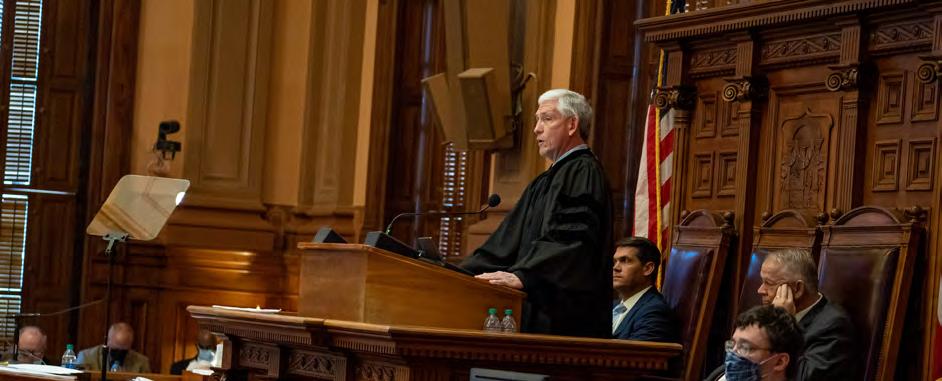
Address to the legislature on February 8, 2022.
Keeping Courts as Open as Possible
“As we’ve learned more about dealing with the ever-changing COVID challenges, we’ve realized that the best approach at this point is not broad, statewide directives, but rather more tailored responses at the local level. In this regard, I want to recognize and thank the leaders of our local judicial systems, the Chief Superior Court Judges of our 50 judicial circuits, who have taken on the primary responsibility for addressing COVID as it affects the courts in their areas.”
Remote Proceedings and In-Person Proceedings
“Virtual proceedings are one of the lessons learned during the pandemic that will be used long after it dissipates. We’ve found that for many proceedings with few participants and limited evidentiary disputes, Zoom hearings can be as effective, and far more efficient, than traditional proceedings with everyone in a courtroom. . . . But many judicial proceedings cannot be done effectively, or even lawfully, by videoconference. These proceedings require the participants to be live and in-person in a courtroom, and they often require a significant number of participants. . . . So when COVID rates are skyrocketing – as they were in the spring of 2020, and the winter of 2021, and again with the delta variant last fall and with omicron recently – there may be no way to conduct jury trials in a way that adequately protects the health of those involved. When rates are more moderate, however, our judges have figured out ways to safely conduct jury trials, even high-profile trials that last for several weeks. They’ve done so by requiring masks and improving ventilation and sanitation. They’ve reconfigured courtrooms to socially distance jurors and other participants – or, where courtrooms just weren’t big enough to accommodate jury trials and jury selection, they’ve borrowed or rented larger facilities where possible.”
2 JUDICIAL COUNCIL / ADMINISTRATIVE OFFICE OF THE COURTS ANNUAL REPORT FY 2022
ARPA Funding
“In November, Governor Kemp allocated to the judicial system $110 million in funds that the State received under ARPA — the federal American Rescue Plan Act. These funds cannot be used to supplant normal operating budgets that let courts handle the ongoing flow of new cases being filed.”
“The Judicial Council, through a committee chaired by Presiding Justice Michael Boggs and staffed by the Administrative Office of the Courts, worked diligently to establish an application process and award initial grants totaling nearly $25 million to 26 judicial circuits in late December, so those funds have already started to be used. The second round of grants will be awarded later this month; a total of 42 of our 50 judicial circuits have now applied. This has been a complicated task, but Presiding Justice Boggs, his committee, the AOC, and the judicial circuits have worked very hard, and we all greatly appreciate this financial support.”
The Challenge is Backlogs and New Cases
“The issue is not just the backlogs of cases that have built up over the past two years. New cases keep getting filed in all of our courts, sometimes at higher rates than before the pandemic where crime rates have increased.”
“The Atlanta Braves canceled 102 games during the 2020 baseball season due to COVID. Those games were just canceled forever, not postponed to be resolved later like court cases have to be. What if those games eventually had to be played, and the Braves had to postpone another 102 games last season. They would be looking at an upcoming season with the usual 162 games, plus 102 games from 2020 and another 102 games from 2021. That’s a 366 game season, and I’m not sure even our World Series champs could handle that. This is the situation some of our courts are facing right now with their overall caseloads.”
Mental Health and Accountability Courts
“Our accountability courts have had to be particularly creative during the pandemic in balancing remote and in-person check-ins, group meetings, and treatment sessions. But they have continued to be successful in reducing recidivism rates, saving the State money by allowing offenders to re-enter society and the workforce rather than being incarcerated, and, most importantly, saving lost souls.”
“But beyond accountability courts, communities across Georgia need more resources to serve our fellow citizens with mental health issues. Addressing this problem is not just good for our justice system and our economy; it’s a moral imperative.”
3
STATE OF THE JUDICIARY
From the Director
Onbehalf of the Judicial Council of Georgia and the Administrative Office of the Courts (AOC), I am pleased to share our 49th Annual Report covering our work during the Fiscal Year 2022. The AOC was created by statute in 1973 to serve the Judicial Council which is the statewide policy making body for the judicial branch of Georgia. The Judicial Council consists of 27 judges representing all classes of court throughout the state; the only non-judge on the Judicial Council is the President of the State Bar of Georgia who serves as a non-voting member and who brings the Judicial Council’s total membership to 28.
In FY 22, we found ourselves in year three of the COVID-19 pandemic throughout which we have remained fully functional, successfully navigating the many variant surges, and meeting the many new demands brought on by the pandemic. The way in which the JC/AOC works has changed dramatically since 2020. Leveraging technology to support online or hybrid meetings and increased teleworking have become routine, and our adaptability has been the lynchpin of our success. The Georgia Courts have also dramatically changed the way in which they do business. All-day Zoom hearings streamed to YouTube have become routine for many classes of court and the efficiency of Zoom hearings has helped courts work at a brisk pace to address the high volume of work that remained once the statewide judicial emergency was lifted in July 2021. The Judicial COVID-19 Task Force, led by Justice Shawn LaGrua and Chief Judge T. Russell McClelland, continues to meet regularly to stay abreast of pandemic trends, challenges, and successes and to update the Council's Pandemic Bench Book with best practices and lessons learned. A new Ad Hoc Committee was created this year to manage
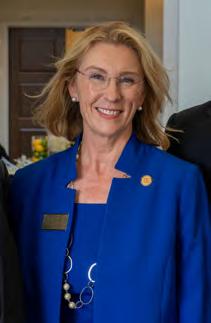
4 JUDICIAL COUNCIL / ADMINISTRATIVE OFFICE OF THE COURTS ANNUAL REPORT FY 2022
Cynthia H. Clanton, Director, Administrative Office of the Courts.
and distribute $96 million of ARPA (American Rescue Plan Act of 2021) funds to provide resources to address case backlogs, especially cases involving serious violent felonies.

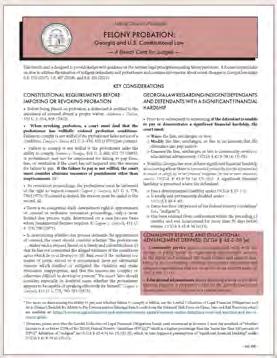
We had a successful legislative session with the passage of the Superior and State Court Appellate Practice Act (HB 916) which was many years in the making. We also celebrated the unanimous passage of the Mental Health Parity Act (HB 1013). Justice Boggs, Chief Judge Brian Amero, and many other judges did a tremendous amount of behind-the-scenes work to support that legislation. We are grateful to the Georgia General Assembly and Governor Kemp for supporting our legislative goals this year.
In April 2022, after a two-year hiatus, we held our first in-person Judicial Council meeting since the pandemic began in March 2020. At that meeting, the Judicial Council said goodbye to Chief Justice Nahmias; incoming Judicial Council Vice Chair Justice Nels S.D. Peterson expressed appreciation to the Chief for his leadership over the past two years during which he chaired or presented at over 50 Judicial Council meetings. We are grateful that the need for monthly, and at times even more frequent, Judicial Council meetings has waned and we have returned to our traditional rhythm of quarterly meetings. We continue to provide staff support to all Judicial Council Committees. Our Access to Justice Committee staff has returned to hosting in-person Record Restriction Clinics, our Legislation Committee staff updated the Felony Probation Bench Card, and our Office of Court Professionals staff administered many in person process server exams. We continue to update our JC/AOC strategic plan and hosted numerous virtual,

5
Recently updated Felony Probation bench cards.
FROM THE DIRECTOR
The staff to the Judicial Council Acccess to Justice Committee facilated Record Restriction Clinics accross Georgia.
From the Director continued





hybrid, and in-person meetings. We were especially focused on wellness initiatives for our staff and our courts in 2022 and will remain so going forward. We welcome the new State Wellness Center coming to our state offices.



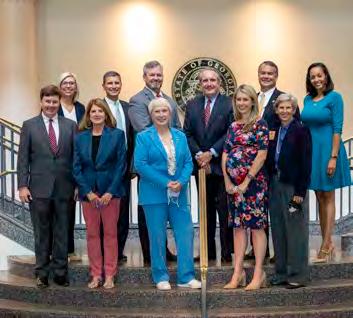
As part of our strategic plan, our communications staff works to enhance the professional and ethical image of the judiciary in the community through a number of creative events and resources. We once again hosted a Twitter Town Hall to celebrate Constitution Day (September 17), created a video with Judicial Council members that also incorporated animation to celebrate Bill of Rights Day (December 15), and hosted a wonderful Law Day Art Contest for Georgia students along this year's theme of Toward a More Perfect Union (May 1). In August, we took time to applaud the Georgia Uniform Mediation Act working group members and their supporters who received commendation from Georgia Commission on Dispute Resolution Chair Hon. M. Cindy Morris for their work in service of the expansion of mediation in Georgia. In November, in honor of National Veterans & Military Families Month, we enjoyed working with the Council of Accountability Court Judges to create a series of posts highlighting Georgia’s Veterans Treatment Courts.

6 JUDICIAL COUNCIL / ADMINISTRATIVE OFFICE OF THE COURTS ANNUAL REPORT FY 2022
Members of the Georgia Uniform Mediation Act working group.
A celebration of Georgia’s Veteran Treatment Courts.
As we close June 2022, we look forward to welcoming our new Chief Justice Michael P. Boggs and our new Presiding Justice Nels S.D. Peterson. We will support them in their many new roles, including as Chair and Vice Chair of the Judicial Council of Georgia. We are certain the coming year will be eventful and productive. It is my privilege to serve as the AOC Director and we remain in service to the judicial branch.
With appreciation and respect,
 Cynthia H. Clanton, Esq. Director Administrative Office of the Courts
Cynthia H. Clanton, Esq. Director Administrative Office of the Courts

7 FROM THE DIRECTOR
Administrative Office of the Courts (AOC) Mission
The Judicial Council and AOC lead collaboration on policy across Georgia’s courts to improve the administration of justice in Georgia.
Vision
To improve justice in all Georgia courts through collaboration, innovation, and information. As staff to the Judicial Council of Georgia, the Administrative Office of the Courts provides subject-matter expertise on policy, court innovation, legislation, and court administration to the state’s trial and appellate courts. The AOC also furnishes a full range of information technology, budget, and financial services at the request of judicial clients.

8 JUDICIAL COUNCIL / ADMINISTRATIVE OFFICE OF THE COURTS ANNUAL REPORT FY 2022
About the AOC
In addition to staffing all meetings for the Judicial Council and its committees (ad hoc and standing), the AOC provides fiscal, legal, human resource, technology, legislative tracking, research, communication, and liaison services to multiple classes of courts and judicial branch partners.
DIRECTOR’S DIVISION is comprised of Human Resources, Governmental and Trial Court Liaison, General Counsel, and Budget. The Director determines priorities, strategy, and direction of the agency and oversees its divisions.
FINANCIAL ADMINISTRATION DIVISION provides fiscal services for the Judicial Council, AOC, certain courts, and other judicial branch organizations. Services provided include: payroll administration, budget preparation and management, audit compliance, invoicing, fixed asset management, and management of accounts receivable and payable at the request of judicial clients. The Financial Administration staff also provides budget data to the Governor’s Office and General Assembly on behalf of each Judicial Council budgetary unit.
COMMUNICATIONS, CHILDREN, FAMILIES, AND THE COURTS DIVISION supports court system initiatives and partnerships that improve outcomes for Georgia’s most vulnerable citizens–among them: children in foster care, victims of domestic violence, persons with disabilities who need improved access to the courts, and families seeking child support. It includes staff support
to the Georgia Child Support Commission, the Georgia Supreme Court Committee on Justice for Children, the Judicial Council Standing Committee on Access to Justice and oversees grant management for victims of domestic violence. A combination of state, federal and private funds finance this work. The staff serves as a liaison to the Council of Accountability Court Judges and the Georgia Commission on Family Violence. This Division also houses the Communications Department for the entire AOC.
INFORMATION TECHNOLOGY DIVISION develops, supports, and enhances automation solutions for all levels of court throughout the State of Georgia. The AOC IT Division offers consulting and research services, provisioning of hardware resources and compliance with legislative mandates as well as keeping up with industry fluctuations and develops, supports and enhances automation projects for all levels of court throughout the State of Georgia.
JUDICIAL SERVICES DIVISION is made up of two offices: Research and Data Analysis, and Court Professionals. Through these two offices, this division provides data-driven analysis of the state’s trial courts and oversees the policy and regulatory matters of Georgia’s court professionals.
9
ADMINISTRATIVE OFFICE OF THE COURTS
FY 2022 Highlights
July 2021
1. The Investiture of Chief Justice David E. Nahmias takes place on July 1.
2. The White House convened a meeting on Eviction Prevention which included a panel featuring Cobb Chief Magistrate Judge Brendan Murphy (picture 2, top right), who discussed the program built from scratch by leaders in Cobb.
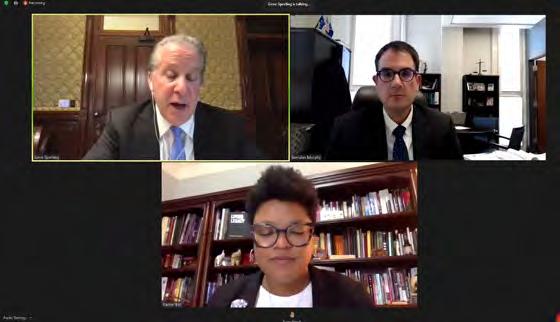
August 2021
3. The Judicial Council of Georgia convenes for a General Session on August 13, Chief Justice Nahmias’s first serving as chair.

4. The Judicial Council’s Standing Committee on Access to Justice (A2J Committee) hosts a virtual record restriction clinic in partnership with Georgia Legal Aid and the Georgia Justice Project.


5. A2J Committee chair Justice Charlie Bethel hands the reins to its new chair, Justice Verda Colvin.

10 JUDICIAL COUNCIL / ADMINISTRATIVE OFFICE OF THE COURTS ANNUAL REPORT FY 2022 5 4 2 3
1
September 2021


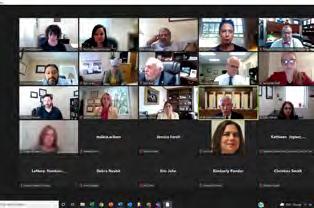


October 2021

11 FY 2022 HIGHLIGHTS 7 6 10 9 8
6. Justice Carla W. McMillian chairs the inaugural meeting of the newly re-formed Judicial Council Standing Committee on Court Interpreters.
7. 15 Georgia judges participated in the Judicial Council’s sixth annual Twitter Town Hall, answering questions from students across the state on September 17.
8. The Board of Court Reporting meets on September 10. Judge John K. Edwards is voted in as chair; Randi Stumlauf is voted in as vice chair.
9. The Judicial COVID-19 Task Force co-chaired by Justice Shawn Ellen LaGrua and Judge Russell McClelland meets on September 22, convening stakeholders statewide to discuss COVID concerns.
10. The Judicial Council’s Standing Committee on Court Reporting Matters meets on October 8. The meeting was the first chaired by Vice Chief Judge Amanda Mercier.
11
11. On October 28, the allocation of $110 million in federal American Rescue Plan Act (ARPA) funds to the address backlogs of court cases was announced. Judicial Council Ad Hoc Committee on American Rescue Plan Act (ARPA) Funding is formed.
FY 2022 Highlights
November 2021
12. The Judicial Council Ad Hoc Committee on American Rescue Plan Act Funding, chaired by Presiding Justice Michael P. Boggs, holds its first meeting on November 4.
13. In partnership with the Georgia Office of the Child Advocate and the Georgia Division of Family and Children Services, the Supreme Court of Georgia Committee on Justice for Children holds "The Summit: Georgia's Child Welfare Conference" on November 17-19. Chief Justice David E. Nahmias delivered opening remarks.

14. On November 19, the Governor's Behavioral Health Reform and Innovation Commission subcommittees on Mental Health Courts & Corrections (chaired by Justice Michael Boggs) and Involuntary Commitment (chaired by Judge Brian Amero) meets.

December 2021
15. The Judicial Council of Georgia meets on December 10 to discuss ARPA Funding, Legislation, Budget, Technology, Judicial Workload, Judicial COVID-19 Task Force, and Strategic Plan.
16. In honor of Bill of Rights Day (December 15), the Administrative Office of the Courts produced a short, animated video with judges from across the state reading the Bill of Rights. The video was shared with social studies teachers and included in civics curriculums.

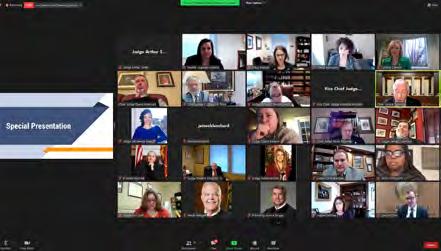

12 JUDICIAL COUNCIL / ADMINISTRATIVE OFFICE OF THE COURTS ANNUAL REPORT FY 2022
16 15 14 13 12
January 2022
17. The Judicial Council Ad Hoc Committee on American Rescue Plan Act Funding opens its second application period from January 1 to January 15. The Committee awarded over $24 million to 26 circuits in its first application period.
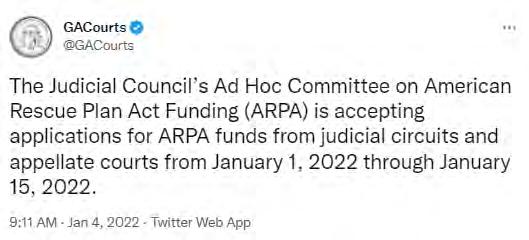
18. On January 7, the Judicial Council of Georgia held an emergency session to address the Omicron surge.
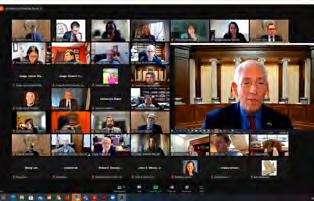
19. The Union City Municipal Court Resource Center is awarded the Project of the Year by the Georgia Municipal Court Clerks' Council and featured in the Georgia Courts Journal (pictured: Clerk Kristie Tucker and Judge Ronald J. Thompson, Jr.).

February 2022
20. February 2 is World Read Aloud Day. Fulton Chief Magistrate Judge Cassandra Kirk celebrates by reading "Tomorrow I'll Be Kind" and "What Can a Citizen Do" to students from Medlock Bridge and Manning Oaks elementary schools.

21. On February 18, The Judicial Council Ad Hoc Committee on American Rescue Plan Act Funding announced over $15 million in funds awarded to 22 judicial circuits from its recent application period.

22. In celebration of Black History Month, the Administrative Office of the Courts produced a series on social media with Georgia's black judges answering a question about who inspired them to become judges (pictured: Justice Verda Colvin).

13 22 FY 2022 HIGHLIGHTS 21 17 18 20 19
FY 2022 Highlights
March 2022
23. Several JC/AOC committees met in March. The Judicial Workload Assessment Committee met on March 11, where AOC staff demonstrated a new data dashboard. The Strategic Plan Committee met on March 25 to review the progress of several initiatives.

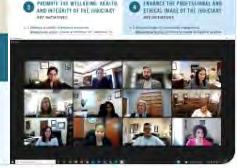
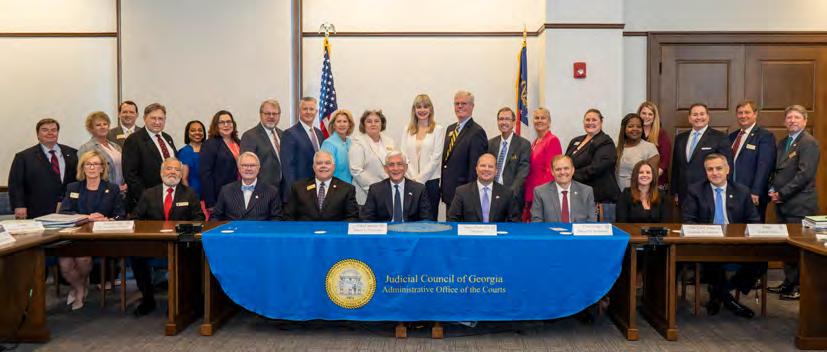
24. On March 23, the Child Support Commission staff hosted back-to-back child support calculator trainings for staff of the Division of Child Support Services.
25. In celebration of Women's History Month, the Administrative Office of the Courts produced a series on social media with Georgia's women judges answering a question about who inspired them to become judges (pictured: Judge Caroline Evans).


April 2022
26. The 2022 Law Day Art Contest winners were announced. Over 200 entries from schools across the state were received.
27. April 22 was Chief Justice Nahmias's final Judicial Council meeting before stepping away from the bench in July.

14 JUDICIAL COUNCIL / ADMINISTRATIVE OFFICE OF THE COURTS ANNUAL REPORT FY 2022
27 26 25 24 23
May 2022
28. The first round of Time and Motion Study Focus Groups facilitated by JC/ AOC Office of Research and Data Analysis commenced in Fayette County on May 3.
29. The Judicial Council Ad Hoc Committee on American Rescue Plan Act Funding announced over $3 million more in awards. A total of 42 of 50 judicial circuits were awarded ARPA funds in CY22.

30. The Judicial Council's Standing Committee on Technology met on May 26, updates were given about the georgiacourts. gov website, new rules, and a project involving traffic citations.


June 2022
31. The State Bar of Georgia's Annual Meeting was well attended by judges. Included was a panel discussion with Presiding Judge Stephen Dillard, Justice Shawn LaGrua, Vice Chief Judge Amanda Mercier, and Judge Trea Pipkin.
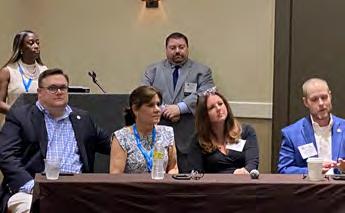
32. FY22 closed similarly to how it began; by engaging stakeholders throughout the state in subjectspecific committees to incrementally improve Georgia's judicial branch for the citizens it touches. The Standing Committee on Grants met on June 28, and A2J Committee met on June 30.

15 FY 2022 HIGHLIGHTS
32 29 28 31 30
The Amended

2022 budget was increased $1,093,024. The legislature made the following adjustments.
The final Amended FY 2022 Judicial Council budget was $16,708,906. The Chart below shows how the funding is spread across the Judicial Council’s budget programs:
The entire Judicial Branch was appropriated $146,140,047 for FY 2022 during the 2021 legislative session. The Judicial Branch state appropriation accounts for less than 1% of Georgia’s annual operating budget.


16 JUDICIAL COUNCIL / ADMINISTRATIVE OFFICE OF THE COURTS ANNUAL REPORT FY 2022
2022 LEGISLATIVE SESSION Amended Fiscal Year 2022 Budget Amount Funded Judicial Council - Administrative Office of the Courts Restore funds for operations of the Administrative Office of the Courts $ 569,928 Judicial Council – Council of Magistrate Court Judges: Restore funds for operations of the Council of Magistrate Court Judges $ 27,023 Judicial Council – Council of Probate Court Judges Restore funds for operations of the Council of Probate Court Judges $ 25,964 Judicial Council Increase funds for a $5,000 pay increase for all full-time, benefit eligible state employees to address agency recruitment and retention need $ 340,326 Council of Accountability Court Judges Increase funds to restore FY21 Budget reductions Increase funds for a $5,000 pay increase for all full-time, benefit eligible state employees to address agency recruitment and retention need $ $ 18,594 32,935 Office of Dispute Resolution Increase funds for a $5,000 pay increase for all full-time,
to address agency recruitment and
$ 8,074 Institute of Continuing Judicial Education Increase funds for a $5,000 pay increase for all full-time,
eligible
employ-
to address agency recruitment and
$ 39,488 Judicial Qualifications Commission IIncrease funds for a $5,000 pay increase for
employ-
to
$ 30,692 TOTALS $ 1,093,024
Budget FY
benefit eligible state employees
retention need
benefit
state
ees
retention need
all full-time, benefit eligible state
ees
address agency recruitment and retention need
FY
Georgia's Judicial Branch Budget FY 2022 JUDICIAL BRANCH BUDGET Administrative Office of the Courts FY 2022 JUDICIAL COUNCIL BUDGET $3,172,074 $5,578,279 $7,958,623 Other Judicial Support Subprograms Seperate Judicial Council Programs Georgia's Budget
FISCAL YEAR 2019 - 2023 JUDICIAL BRANCH ANNUAL BUDGETS
Judicial Branch budgets over the last five years:
17 Other AGENCY NAME FY 2019 FY 2020 FY 2021 FY 2022 FY 2023* Court of Appeals $ 21,353,318 $ 22,304,557 $ 21,959,337 $ 23,463,103 $ 24,812,200 State-wide Business Court 1,396,940 $ $1,761,123 $ 1,806,747 Judicial Council $ 15,832,325 $ 16,571,037 $ 14,359,385 $ 16,708,976 $ 19,248,576 Juvenile Courts $ 8,654,701 $ 9,010,048 $ 8,666,187 $ 8,882,238 $ 9,659,249 Superior Courts $ 73,613,912 $ 75,909,534 $ 72,209,945 $ 79,063,120 $ 84,873,450 Supreme Court $ 14,356,302 $ 14,985,899 $ 14,191,947 $ 16,261,487 $ 17,557,045 TOTALS $ 133,810,558 $ 138,781,075 $ 132,783,741 $ $146,140,047 $ 157,957,267 Superior CourtsSupreme Court Juvenile Courts Judicial Council Court of Appeals $80M $40M $50M $60M $70M FY 2019FY 2020FY 2021 FY 2023* FY 2022 $30M $10M $20M State-wide Business Court 5 Year Increase 16% 29% 22% 15% 22% 12%
BUDGET
*General Budget Figures
FY 2022 Legislation
The Judicial Council supports legislation to:
1. Repeal and replace the current notice of appeal and certiorari review statutes in OCGA Chapters 3 and 4 of Title 5 with a single petition for review procedure for appealing a case from a lower judicatory to superior or state court (Judicial Council). Final Passage, SB 916.
2. Modernize and update the Court Reporting Act of Georgia and related statutes (OCGA Titles 5; 9; 15; 17), to include authorization for the use of digital recording systems in courts and for the development of rules and regulations to govern such use (Judicial Council). No legislation filed.
3. Amend OCGA § 29-3-3 to clarify the meaning of “gross settlement” and define “net settlement” when the appointment of a conservator for a minor is required (Council of State Court Judges/Judicial Council). Final Passage, HB 620.
4. Amend OCGA § 17-6-72 to clarify when a surety may be released from a bond (Council of State Court Judges). Final Passage, HB 1183.
The General Assembly also passed legislation creating new superior court judgeships in the following judicial circuits, as recommended by the Judicial Council:
• HB 624: Provides for an additional superior court judge in the South Georgia Judicial Circuit.
• HB 56: Provides for an additional superior court judge in the Blue Ridge Judicial Circuit.
• SB 395: Provides for an additional superior court judge in the Mountain Judicial Circuit.
18 JUDICIAL COUNCIL / ADMINISTRATIVE OFFICE OF THE COURTS ANNUAL REPORT FY 2022
The Judicial Council
Judicial Council of Georgia
Authorized and Directed by Statute (Ga. L. 1945, 1973, 1983, 1984).
Created by Supreme Court Order (Amended May 2016).
All Judicial Council Members serve Ex-officio.
The Director of the AOC is the Secretary of the Judicial Council pursuant to its bylaws.
Chair
Chief Justice David E. Nahmias, Supreme Court of Georgia
Vice-Chair
Presiding Justice Michael P. Boggs, Supreme Court of Georgia
Council Members:
Chief Judge Brian M. Rickman, Court of Appeals of Georgia
Vice Chief Judge Amanda H. Mercier, Court of Appeals of Georgia
Judge Walter W. Davis, Georgia State-wide Business Court
Judge Wade Padgett, Superior Court, Columbia Judicial Circuit
Judge Arthur L. Smith III, Superior Court, Chattahoochee Judicial Circuit
Judge Jeffrey H. Kight, Superior Court, Waycross Judicial Circuit
Judge Melanie B. Cross, Superior Court, Tifton Judicial Circuit
Judge W. James Sizemore, Superior Court, Southwestern Judicial Circuit
Chief Judge Asha Jackson, Superior Court, Stone Mountain Judicial Circuit
Chief Judge Christopher S. Brasher, Superior Court, Atlanta Judicial Circuit
Chief Judge W. Fletcher Sams, Superior Court, Griffin Judicial Circuit,
Judge Robert E. Flournoy III, Superior Court, Cobb Judicial Circuit
Chief Judge Sarah F. Wall, Superior Court, Oconee Judicial Circuit
Judge R. Timothy Hamil, Superior Court, Gwinnett Judicial Circuit
Judge James G. Blanchard, Superior Court, Columbia Judicial Circuit
Judge Alvin T. Wong, State Court, DeKalb County
Judge R. Violet Bennett, State Court, Wayne County
Chief Judge C. Gregory Price, Juvenile Court, Rome Judicial Circuit
Judge Render M. Heard, Jr., Juvenile Court, Tifton Judicial Circuit
Judge Thomas Lakes, Probate Court, Harris County
Judge B. Shawn Rhodes, Probate Court, Wilcox County
Judge Quinn M. Kasper, Magistrate Court, Cobb County
Chief Judge Rebecca J. Pitts, Magistrate Court, Butts County
Judge Lori B. Duff, Municipal Court, City of Monroe
Judge JaDawnya C. Baker, Municipal Court, City of Atlanta
Elizabeth Fite, Attorney, President of State Bar of Georgia (Non-Voting Member)
Judicial Council members as of July 1, 2021
20 JUDICIAL COUNCIL / ADMINISTRATIVE OFFICE OF THE COURTS ANNUAL REPORT FY 2022

JUDICIAL COUNCIL OF GEORGIA STANDING COMMITTEES
Access to Justice (A2J)
Staff to Committee: Tabitha Ponder
Authorized by Judicial Council Bylaws, Created by Supreme Court Order
Name Role Location Position
Verda M. Colvin Supreme Court Justice Statewide Chair
Robert Benham Supreme Court Justice (ret.) Statewide Emeritus Member
Carol W. Hunstein Supreme Court Justice (ret.) Statewide Emeritus Member
Bill Adams Attorney Statewide State Bar of Georgia Representative
Cynthia C. Adams Superior Court Judge Douglas County Accountability Court Representative
MJ Blakely Attorney Statewide Gate City Bar Association
Leisa G. Blount Probate Court Judge Dougherty County Probate Court Representative
Walter W. Davis State-wide Bus. Court Judge Statewide State-wide Business Court Representative
Tony DelCampo Attorney Statewide GA Hispanic Bar Association Representative
Sara L. Doyle Court of Appeals Judge Statewide Court of Appeals Representative
V. Sharon Edenfield Attorney Statewide State Bar, Young Lawyers Division
Belinda Edwards Superior Court Judge Atlanta Circuit Superior Court Representative
Jana Edmondson-Cooper Attorney Statewide Georgia Commission on Interpreters
Terica Redfield Ganzy Attorney Statewide GA Assoc. of Black Women Lawyers Rep.
Mike Jacobs State Court Judge DeKalb County Stonewall Bar Association Representative
Tracy Johnson Executive Director Office of Dispute Resolution Georgia Office of Dispute Resolution
Monica Khant Attorney Statewide Georgia Asian Pacific American Bar Association
Ethan Pham Municipal Court Judge City of Morrow Municipal Court Representative
Brendon Shawn Rhodes Magistrate Court Judge Wilcox County Magistrate Court Representative
Will Simmons District Court Administrator 6th Judicial Circuit Clerk/Court Administrator Representative
Jason B. Thompson State Court Judge Fayette County State Court Representative
Maureen Wood Juvenile Court Judge Rockdale Circuit Juvenile Court Representative
Kristina Blum Magistrate Court Judge Gwinnett County Advisory Member
Clarence Cuthpert State Court Judge Rockdale County Advisory Member
LaTisha Dear Jackson Superior Court Judge DeKalb County Advisory Member
Karlise Grier Executive Director CJCP Advisory Member
Vicky Ogawa Kimbrell Attorney Statewide Advisory Member
Cassandra Kirk Magistrate Court Judge Fulton County Advisory Member
Mike Monahan Attorney Statewide Advisory Member
JoAnna Smith Attorney Statewide Advisory Member, Lawyers for Equal Justice
Nicki Vaughan Attorney Statewide Advisory Member, Public Defender Association
Mission
To improve the public’s trust in the judicial branch by promoting meaningful and effective access to courts and fairness for all.
22 JUDICIAL COUNCIL / ADMINISTRATIVE OFFICE OF THE COURTS ANNUAL REPORT FY 2022
Budget
Staff to Committee: Maleia Wilson
Authorized by Judicial Council Bylaws, Created by Supreme Court Order
Name
Role Location Position
Charles Bethel Supreme Court Justice Statewide Chair
Sara Doyle Court of Appeals Judge Statewide Vice-Chair
Walter Davis Georgia State-wide Business Court Statewide Member, State-wide Business Court Judge
Arthur L. Smith III Superior Court Judge Chattahoochee Circuit Member, President-Elect, Council of Superior Court Judges
R. Violet Bennett State Court Judge Wayne County Member, President-Elect, Council of State Court Judges
Render M. Heard Juvenile Court Judge Tifton Circuit Member, President-Elect, Council of Juvenile Court Judges
B. Shawn Rhodes Probate Court Judge Wilcox County Member, President-Elect, Council of Probate Court Judges
Rebecca J. Pitts Magistrate Court Judge Butts County Member, First Vice President, Council of Magistrate Court Judges
JaDawnya C. Baker Municipal Court Judge City of Atlanta Member, President-Elect of the Council of Municipal Court Judges
Nailah McFarlane Municipal Court Judge City of Fayettelville Advisory Member, Budget Chair of Council of Municipal
Maria Golick State Court Judge Cobb County Advisory Member, Budget Chair of Council of State Court Judges
Mike Greene Probate Court Judge Jones County Advisory Member, Budget Chair of Council of Probate Court Judges
Cynthia Clanton Director Statewide Advisory Member, JC/AOC
Shannon Weathers Executive Director Statewide Advisory Member, Council of Superior Court Judges
Bob Bray Executive Director Statewide Advisory Member, Council of State Court Judges
Eric John Executive Director Statewide Advisory Member, Council of Juvenile Court Judges
Kevin Holder Executive Director Statewide Advisory Member, Council of Probate Court Judges
Sharon Reiss Executive Director Statewide Advisory Member, Council of Magistrate Court Judges
Mission
The Budget Committee handles the initial review of Judicial Council, AOC, and all subprogram budgets and recommends continuation funding and enhancement requests to the Judicial Council for approval.
23
JUDICIAL COUNCIL STANDING COMMITTEES
JUDICIAL COUNCIL OF GEORGIA STANDING COMMITTEES CONTINUED
Court Interpreters
Staff to Commission: Stephanie Hines
Authorized and Created by the Supreme Court https://ocp.georgiacourts.gov/
Carla Wong McMillian Supreme Court Justice Statewide Chair
Clyde Reese Court of Appeals Judge Statewide Member
Angie T. Davis Clerk of Court, Georgia State-Wide Business Court Statewide Member
Kellie Hill Superior Court Judge Cobb Circuit Member
C. Jean Bolin State Court Judge McIntosh County Member
Amber Patterson Juvenile Court Judge Cobb Circuit Member
Sandra Pak Probate Court Judge Gwinnett County Member
William Brogdon Magistrate Court Judge Gwinnett County Member
Norman Cuadra Municipal Court Judge City of Suwanee Member
Manchilo Guadie, Esq. State Bar Representative Statewide Member
Scott Holcomb State Representative District 82 Advisory Member
John Kennedy State Senator District 18 Advisory Member
Jana Edmondson-Cooper Attorney Statewide Advisory Member
Dax Lopez, Esq. Attorney Statewide Advisory Member
Tomisha Stanford, Esq. Attorney Statewide Advisory Member
Paul Panusky, Esq. Attorney Statewide Advisory Member
Michelle Gonzales Certified Court Interpreter Statewide Advisory Member
Maria Ceballos-Wallis Certified Court Interpreter Statewide Advisory Member
S. Lynn Epps Court Administrator Cherokee Circuit Advisory Member
Mission
To provide interpreter licensing and education services for Georgia courts to ensure the rights of non-English speaking persons in court and during any court-related events.
24 JUDICIAL COUNCIL / ADMINISTRATIVE OFFICE OF THE COURTS ANNUAL REPORT FY 2022
Name
Role Location Position
Court Reporting Matters
Staff to Committee: Stephanie Hines
Authorized by Judicial Council Bylaws, Created by Supreme Court Order
Name
Role Location
Position
Amanda H. Mercier Court of Appeals Judge Statewide Chair
Carla Wong McMillian Supreme Court Justice Statewide Supreme Court Representative
Walter Davis State-wide Business Court Judge Statewide State-wide Business Court Representative
Robert McBurney Superior Court Judge Atlanta Circuit Superior Court Representative
J. Kelly Brooks Superior Court Judge Waycross Circuit Superior Court Representative
Jane Morrison State Court Judge Fulton County State Court Representative
John K. Edwards State Court Judge Lowndes County State Court Representative
Robin W. Shearer Juvenile Court Judge Western Circuit Juvenile Court Representative
Linnie Darden, III Juvenile Court Judge Atlantic Circuit Juvenile Court Representative
Sarah S. Harris Probate Court Judge Bibb County Probate Court Representative
Rebecca Pitts Magistrate Court Judge Butts County Magistrate Court Representative
James Anderson, III Municipal Court Judge City of Norcross Municipal Court Representative
Mission
The Court Reporting Matters Committee acts on behalf of the Judicial Council in handling appeals from decisions of the Board of Court Reporting; reviews and recommends changes to court reporting rules and fee schedules; approves Board of Court Reporting opinions; and recommends candidates for Board of Court Reporting membership.
25
JUDICIAL COUNCIL STANDING COMMITTEES
JUDICIAL COUNCIL OF GEORGIA STANDING COMMITTEES CONTINUED
Grants
Staff to Committee: Carole Collier
Authorized by Judicial Council Bylaws, Created by Supreme Court Order
William T. Boyett Superior Court Judge Conasauga Circuit Chair
Melanie B. Cross Superior Court Judge Tifton Circuit Vice Chair
Anne Barnes Court of Appeals Judge Statewide Court of Appeals Representative
Walter Davis Business Court Judge Statewide Business Court Representative
Eric A. Richardson State Court Judge Fulton County State Court Representative
William P. Bartles Juvenile Court Judge Flint Circuit Juvenile Court Representative
Melanie M. Bell Probate Court Judge Newton County Probate Court Representative
Cassandra Kirk Magistrate Court Judge Fulton County Magistrate Court Representative
Graham McKinnon IV Municipal Court Judge City of Braselton Municipal Court Representative
Brian A. McDaniel Superior Court Judge Southern Circuit Accountability Court Representative
Linda Klein Attorney State Bar Representative
Amy Howell Attorney State Bar Representative
April Ross Georgia Commission on Family Violence Statewide Advisory Member
Jody Overcash District Court Administrator
Mission
The Standing Committee on Grants administers grant funds awarded to the Judicial Council or Administrative Office of the Courts, and reviews applications for those funds. This Committee is a successor to the Judicial Council Domestic Violence Committee.
7th Judicial District Advisory Member
The Committee awarded funds for:
• Services provided for over 2,700 protective-order-related cases
• 5,000 women were protected
• 6,000+ children were helped
• 580 victims received legal assistance related to custody of their children
• Over $540,000 in financial benefits for victims were obtained
• 2,375 other cases were covered
• Legal services were provided in almost every judicial circuit of the state. Over 50% of protective order cases were provided in non-metro Atlanta circuits.
26 JUDICIAL COUNCIL / ADMINISTRATIVE OFFICE OF THE COURTS ANNUAL REPORT FY 2022
Name
Role Location Position
GRANTS COMMITTEE MILESTONES FOR FY2022
Judicial Workload Assessment
Staff to Committee: Stephanie Hines and Jeffrey Thorpe, III
Authorized by Judicial Council Bylaws, Created by Supreme Court Order
Name Role Location Position
Robert D. Leonard Superior Court Judge Cobb Circuit Chair
Russell Smith Superior Court Judge Mountain Circuit Vice Chair
Walter Davis State-Wide Business Court Judge Statewide State-wide Business Court Rep.
Stephen Kelley Superior Court Judge Brunswick Circuit 1st District Representative
Denise Marshall Superior Court Judge Dougherty Circuit 2nd District Representative
Jeffery Monroe Superior Court Judge Macon Circuit 3rd District Representative
LaTisha Dear Jackson Superior Court Judge Stone Mountain Circuit 4th District Representative
Robert McBurney Superior Court Judge Atlanta Circuit 5th District Representative
Scott Ballard Superior Court Judge Griffin Circuit 6th District Representative
Robert Flournoy, III Superior Court Judge Cobb Circuit 7th District Representative
Bobby Chasteen Superior Court Judge Cordele Circuit 8th District Representative
Bonnier Oliver Superior Court Judge Northeastern Circuit 9th District Representative
Sheryl B. Jolly Superior Court Judge Augusta Circuit 10th District Representative
Michelle L.H. Helhoski State Court Judge Cherokee County State Court Representative
Render Heard Juvenile Court Judge Tifton Circuit Juvenile Court Representative
Stephanie Hewell Probate Court Judge Elbert County Probate Court Representative
Robert Turner Magistrate Court Judge Houston County Magistrate Court Representative
Matthew Jordan Municipal Court Judge City of Athens Municipal Court Representative
Will Simmons District Court Administrator 6th District Advisory Member
Bob Nadekow District Court Administrator 8th District Advisory Member
Connie Cheatham Clerk of Superior Court McDuffie County Advisory Member
April Garrett
Clerk of Superior Court Cook County Advisory Member
Lelaine Briones Deputy Director, Prosecuting Attorneys' Council Statewide Advisory Member
Charles J. Bethel Supreme Court Justice Statewide Advisory Member
Shawn Ellen LaGrua Supreme Court Justice Statewide Advisory Member
Trent Brown Court of Appeals Judge Statewide Advisory Member
Christopher Hansard Court Administrator Cobb County Advisory Member
Mission
The Judicial Workload Assessment Committee determines the methodology for analysis of data collected through annual trial court case counts. Additionally, based on staff studies, the Committee makes recommendations to the Judicial Council on the need for additional judicial personnel.
27
JUDICIAL COUNCIL STANDING COMMITTEES
JUDICIAL COUNCIL OF GEORGIA STANDING COMMITTEES CONTINUED
Legislation
Staff to Committee: Tracy Mason
Authorized by Judicial Council Bylaws, Created by Supreme Court Order
Name Role Location Position
Michael P. Boggs Presiding Justice Statewide Chair
Brian M. Rickman Chief Judge Statewide Vice Chair
J. Wade Padgett Superior Court Judge Augusta Circuit Member, President of the Council of Superior Court Judges
Alvin T. Wong State Court Judge DeKalb County Member, President of the Council of State Court Judges
C. Gregory Price Juvenile Court Judge Rome Circuit Member, President of the Council of Juvenile Court Judges
Thomas Lakes Probate Court Judge Harris County Member, President of the Council of Probate Court Judges
Quinn M. Kasper Magistrate Court Judge Cobb County Member, President of the Council of Magistrate Court Judges
Lori B. Duff Municipal Court Judge City of Monroe Member, President of the Council of Municipal Court Judges
William Hamrick Superior Court Judge Coweta Circuit Advisory Member, Legislative Chair of Council of Superior Court Judges
David Darden State Court Judge Cobb County Advisory Member, Legislative Co-Chair of Council of State Court Judges
Ronald Ramsey State Court Judge DeKalb County Advisory Member, Legislative Co-Chair of Council of State Court Judges
Render Heard Juvenile Court Judge Tifton Circuit Advisory Member, Legislative Chair of Council of Juvenile Court Judges
Rooney Bowen Probate Court Judge Dooly County Advisory Member, Legislative Chair of Council of Probate Court Judges
Alice Padgett Probate Court Judge Columbia County Advisory Member, Legislative Chair of Council of Probate Court Judges
Megan Kinsey Magistrate Court Judge Butts County Advisory Member, Legislative Co-Chair of Council of Magistrate Court Judges
Brendan F. Murphy Magistrate Court Judge Cobb County Advisory Member, Legislative Co-Chair of Council of Magistrate Court Judges
Charles Barrett Municipal Court Judge City of Duluth Advisory Member, Legislative Co-Chair of Council of Municipal Court Judges
Tommy Bobbitt Municipal Court Judge City of Dublin Advisory Member, Legislative Co-Chair of Council of Municipal Court Judges
Cynthia Clanton Director Statewide Advisory Member, JC/AOC
Shannon Weathers Executive Director Statewide Advisory Member, Council of Superior Court Judges
Bob Bray Executive Director Statewide Advisory Member, Council of State Court Judges
Eric John Executive Director Statewide Advisory Member, Council of Juvenile Court Judges
Kevin Holder Executive Director Statewide Advisory Member, Council of Probate Court Judges
Sharon Reiss Executive Director Statewide Advisory Member, Council of Magistrate Court Judges
Elizabeth Fite President Statewide Advisory Member, State Bar of Georgia
28 JUDICIAL COUNCIL / ADMINISTRATIVE OFFICE OF THE COURTS ANNUAL REPORT FY 2022
Strategic Plan
Staff to Committee: Jessica Farah and Cheryl Karounos
Authorized by Judicial Council Bylaws, Created by Supreme Court Order
Name
Role Location Position
Sara L. Doyle Court of Appeals Judge Statewide Chair
Walter Davis Business Court Judge Statewide Member
Amanda Petty Superior Court Judge Ocmulgee Circuit Member
Gregory V. Sapp State Court Judge Chatham County Member
Temika Williams Murry Juvenile Court Judge DeKalb County Member
Sarah S. Harris Probate Court Judge Bibb County Member
Brandon T. Bryson Magistrate Court Judge Bartow County Member
Matthew M. McCord Municipal Court Judge Stockbridge Member
John J. Ellington Supreme Court Justice Statewide Advisory Member
Rizza P. O'Connor Attorney Advisory Member
Mission
The mission of the Strategic Plan Standing Committee is to create and implement a Judicial Council strategic plan. The committee implements the initiatives of the strategic plan through the staff of the AOC. The FY 20-22 strategic plan was adopted in December 2019 and work under the plan began soon after. The plan was extended through fiscal year 2023 in April of FY21.
Mission
The Legislation Committee reviews legislation affecting the judicial branch and recommends policy positions to the Judicial Council where appropriate.
29
JUDICIAL COUNCIL STANDING COMMITTEES

30 JUDICIAL COUNCIL / ADMINISTRATIVE OFFICE OF THE COURTS ANNUAL REPORT FY 2022

31 JUDICIAL COUNCIL STANDING COMMITTEES
JUDICIAL COUNCIL OF GEORGIA STANDING COMMITTEES CONTINUED
Technology
Staff to Committee: Kristy King
Authorized by Judicial Council Bylaws, Created by Supreme Court Order
Shawn
Stephen Kelley Superior Court Judge
ShaMiracle Johnson Rankin Attorney
Cynthia Parks McCaskill Attorney
Ben Luke
Sheila Studdard
Cindy Mason
Walter Davis
Verda Colvin
Patty Laine
Mission
The Standing Committee on Technology provides guidance and oversight for the Judicial Council’s technology initiatives.
32 JUDICIAL COUNCIL / ADMINISTRATIVE OFFICE OF THE COURTS ANNUAL REPORT FY 2022
Name Role Location Position
Supreme
Justice Statewide Chair
Ellen LaGrua
Court
Douglas
Co-Chair
Circuit
Fulton
Representative
County State Bar
Fulton County
Representative
State Bar
Fulton
Representative
Administrative Office of the Courts
County AOC
Fayette
Representative
Clerk of Superior Court
County Council of Superior Court Clerks
Clerk
Columbia
Representative
of Superior Court
County Clerks’ Cooperative Authority
State-wide
Judge Statewide State-wide Business Court Representative
Business Court
Court
Judge Statewide Court of Appeals Representative
of Appeals
State Court Judge Fulton County State Court Judge Representative
Diane Bessen
Juvenile Court Judge Clayton Circuit Juvenile Court Judge Representative
Bobby Simmons
Probate
Judge Cherokee County Probate Court Judge Representative
Magistrate Court Judge Fulton County Magistrate Court Judge Representative Margaret Washburn Municipal Court Judge City of Sugar Hill Municipal Court Judge Representative T.J. Bement District Court Administrator 10th District Council of Court Administrators Representative Bo Hatchett State Senator 50th District Senate Representative Vacant Clerk of Superior Court Clerks’ Cooperative Authority Representative Stan Gunter State Representative 8th District House Representative Vacant Governor’s Office Governor’s Representative Wright Banks Attorney General’s Office Fulton County Attorney General’s Representative
Court
James Altman
JUDICIAL COUNCIL OF GEORGIA AD HOC COMMITTEES
Committee on American Rescue Plan Act Funding
Staff to Committee: Tracy Mason, Shimike Dodson
Authorized by Judicial Council Bylaws, Created by Supreme Court Order
Voting Members
Mission
The Ad Hoc Committee on American Rescue Plan Act Funding is responsible for reviewing and approving applications for eligible courts and judicial system stakeholders requesting the dissemination of federal American Rescue Plan Act of 2021 funds allocated to the Judicial Branch for eligible expenditures aimed at addressing backlogs of court cases, particularly cases involving serious violent felonies.
33 JUDICIAL COUNCIL AD HOC COMMITTEES
Name Role Location Position
P. Boggs Supreme Court Justice Statewide Chair
H. Mercier Appeals Court Vice Chief Judge Statewide Member Jeffrey H. Kight Superior Court Judge 1st JAD Member Melanie B. Cross Superior Court Judge 2nd JAD Member W. James Sizemore, Jr. Superior Court Judge 3rd JAD Member Asha F. Jackson Superior Court Judge 4th JAD Member Christopher S. Brasher Superior Court Judge 5th JAD Member W. Fletcher Sams Superior Court Judge 6th JAD Member Robert E. Flournoy, III Superior Court Judge 7th JAD Member Sarah F. Wall Superior Court Judge 8th JAD Member R. Timothy Hamil Superior Court Judge 9th JAD Member J. Wade Padgett Superior Court Judge 10th JAD Member Peter J. Skandalakis Director Prosecuting Attorneys Council Member
Michael
Amanda
Committee on American Rescue Plan Act Funding (continued)
Staff to Committee: Tracy Mason, Shimike Dodson
Authorized by Judicial Council Bylaws, Created by Supreme Court Order
Advisory Members
Name
Role Location Position
Angie Davis Georgia State-wide Business Court Clerk Fulton Advisory Member, GSBC designee
Alvin T. Wong State Court Judge DeKalb County Advisory Member, CStCJ President
C. Gregory Price Juvenile Court Judge Floyd County Advisory Member, CJCJ President
Thomas Lakes Probate Court Judge Harris County Advisory Member, CPCJ President
Quinn M. Kasper Magistrate Court Judge Cobb County Advisory Member, CMCJ President
JaDawnya Baker Municipal Court Judge City of Atlanta Advisory Member, CMuCJ designee
Ivy Cadle Attorney State Bar of Georgia Advisory Member, State Bar designee
Brenda S. Weaver Superior Court Judge Appalachian Circuit Advisory Member, CACJ designee
T.J. BeMent District Court Administrator 7th JAD Advisory Member
Robin S. Rooks Court Administrator Forsyth County Advisory Member, President GCCA
Bill Twomey County Consulting Services Manager Association County Commissioners of Georgia Advisory Member, ACCG designee
Alison Earles Associate General Counsel Georgia Municipal Association Advisory Member, GMA designee
J. Terry Norris Executive Director Georgia Sheriff's Assocation Advisory Member
Butch Ayers Executive Director
Georgia Association of Chiefs of Police Advisory Member
C. Tina Robinson Superior Court Clerk Fulton County Advisory Member, GSCC President
LaQuetta Walker Court Reporter Georgia Court Reporters Association Advisory Member, GCRA President
Maria Ceballos-Wallis Court Interpreter Committee on Court Interpreters Advisory Member, Committee on Court Interpreters designee
Omatayo Alli Executive Director
Jason Sheffield GACDL President
Mary Margaret Oliver State Representative
Georgia Public Defender Council Advisory Member
Georgia Association of Criminal Defense Lawyers Advisory Member
GA House District 82 Advisory Member
Brian Strickland State Senator GA Senate District 17 Advisory Member
Vic Reynolds Director Georgia Bureau of Investigation Advisory Member
Mission
The Judicial Council Ad Hoc Committee on Improving Community Access to Legal Resources was established in June 2020 with the mission to support the identification and implementation of effective means of making legal resources available to all users of the our civil justice system, including self-represented litigants.
34 JUDICIAL COUNCIL / ADMINISTRATIVE OFFICE OF THE COURTS ANNUAL REPORT FY 2022
Committee on Improving Community Access to Legal Resources
Staff to Committee: Tabitha Ponder, Herbert Gordon
Authorized by Judicial Council Bylaws, Created by Supreme Court Order
Name Role Location Position
Charles J. Bethel Supreme Court Justice Statewide Co-Chair
Robert C.I. McBurney Superior Court Judge Atlanta Circuit Co-Chair
Willie E. Lockette Superior Court Judge Dougherty Circuit Member
LaTisha Dear Jackson Superior Court Judge Stone Mountain Circuit Member
Cassandra Kirk Magistrate Court Judge Fulton County Member
William P. Adams State Court Judge (ret.) Bibb County Member
Larry B. Mims State Court Judge (ret.) Tift County Member
Jason Ashford State Court Judge Houston County Member, CStCJ Representative
Amber Patterson Juvenile Court Judge Cobb County Member, CJCJ Representative
Detria Carter Powell Probate Court Judge Lowndes County Member, CPCJ Representative
Kevin Morris Magistrate Court Judge Walton County Member, CMaCJ Representative
Norman Cuadra Municipal Court Judge City of Suwanee Member, CMuCJ Representative
Will Simmons District Court Administrator Sixth Judicial District Member
Brad Butler Court Administrator Conasauga Circuit Member
Karlise Grier Executive Director CJCP Member
Michael Monahan Executive Director Pro Bono Resource Center, State Bar of Georgia Member
Jeannie Ashley Director Fulton County Justice Resource Center Member
Jeff Davis Attorney Atlanta Member
Charles T. Lester, Jr. Attorney Atlanta Member
Laureen Kelly Attorney Albany Member
Eleanor Crosby Lanier Associate Dean UGA School of Law Member
Sarah Anderson Attorney Savannah Member, Georgia Legal Services Program Designee
Cathy Waddell Attorney Atlanta Member, Atlanta Legal Aid Society Designee
Yolanda Lewis Snr. Dir., Pew Charitable Trust Atlanta Member
Tammie Mosley Clerk of Court Chatham County Member
Maria Ceballos-Wallis Court Interpreter DeKalb County Advisory Member
Anne Kirkhope Staff Attorney Council of Juvenile Court Judges Advisory Member
Paul Panusky Esq. SC:L, Sign Language, DHH Interpreter. Fulton County Advisory Member
35
JUDICIAL COUNCIL AD HOC COMMITTEES
JUDICIAL COUNCIL OF GEORGIA AD HOC COMMITTEES CONTINUED
Judicial COVID-19 Task Force
Staff to Committee: Cheryl Karounos
Authorized by Judicial Council Bylaws. Created by Supreme Court Order
Voting Members
Name Role Location Position
Shawn Ellen LaGrua Supreme Court Justice Statewide Co-chair
T. Russell McClelland State Court Judge Forsyth County Co-chair
David E. Nahmias Supreme Court Justice Statewide Member
Ken Hodges Appeals Court Judge Statewide Member
Walter W. Davis State-wide Business Court Judge Statewide Member
Kathlene F. Gosselin Superior Court Judge Northeastern Circuit Member
Asha F. Jackson Superior Court Judge DeKalb County Member
Robert D. Leonard II Superior Court Judge Cobb County Member
Lindsay Burton Juvenile Court Judge Hall County Member
Melanie C. Bell Probate Court Judge Newton County Member
Brendan Murphy Magistrate Court Judge Cobb County Member
Norman Cuadra Municipal Court Judge City of Suwanee Member
Elizabeth Fite Attorney, State Bar Representive City of Atlanta Member
Cindy Mason Superior Court Clerk Columbia County Member
Mission
The Judicial COVID-19 Task Force was established May 14, 2020, as an ad hoc committee of the Judicial Council, with the mission of assisting courts in conducting remote proceedings and in restoring more in-court proceedings, in particular jury trials and grand jury proceedings. The Task Force includes judges from the various classes of court and obtains input from key stakeholders including the State Bar of Georgia, prosecutors and public defenders, civil plaintiff and defense attorneys, court clerks, sheriffs, and the public.
36 JUDICIAL COUNCIL / ADMINISTRATIVE OFFICE OF THE COURTS ANNUAL REPORT FY 2022
Judicial COVID-19 Task Force (continued)
Staff to Committee: Cheryl Karounos
Authorized by Judicial Council Bylaws. Created by Supreme Court Order
Advisory Members
Name Role Location Position
Cynthia Clanton Director, AOC Statewide Advisory Member, Administrative Office of the Courts
Bryan Webb Deputy Attorney General Statewide Advisory Member, Georgia Department of Law
Doug Ashworth Executive Director, ICJE Statewide Advisory Member, Institute of Conitnuing Judicial Education
Chuck Boring Director, JQC Statewide Advisory Member, Judicial Qualifications Commission
Cathy Vandenberg Deputy Director Statewide Advisory Member, Atlanta Legal Aid
Robin Rooks Court Administrator Bell-Forsyth Advisory Member, Georgia Council of Court Administrators
Robert Smith General Counsel Statewide Advisory Member, Prosecuting Attorneys' Council
Jimmonique R.S. Rodgers Deputy Director Statewide Advisory Member, Georgia Public Defender Council
Adam Malone Executive Vice President Statewide Advisory Member, Georgia Trial Lawyers Association
David Nelson President Statewide Advisory Member, Georgia Defense Lawyers Association
Don Samuel Past-President Statewide Advisory Member, Georgia Association of Criminal Defense Lawyes
Debra Nesbit Associate Legislative Director Statewide Advisory Member, Association County Commissioners of Georgia
William Custer Attorney City of Atlanta Advisory Member, Georgia Chamber of Commerce - Law and Judiciary Committee
Yvette Daniels DPH Director of University Relations Statewide Advisory Member, Georgia Department of Public Health
Marial Ellis Chief of Staff Statewide Advisory Member, Georgia Department of Community Health
Phil Sellers Chief Information Officer Statewide Advisory Member, Department of Community Supervision
Terry Norris Executive Director Statewide Advisory Member, Georgia Sheriffs' Association
Sheila Ross Director of Capitol Litigation Statewide Advisory Member, Prosecuting Attorneys' Council
Michael Lucas Deputy Director Statewide Advisory Member, Atlanta Volunteer Lawyers Foundation
Dr. Mark Swancutt Staff Physician Statewide Advisory Member, Fulton County Board of Health
Paige Reese Whitaker Superior Court Judge Atlanta Circuit Advisory Member
37 JUDICIAL COUNCIL AD HOC COMMITTEES
Connected Boards, Committees, Commissions, and Councils
Board of Court Reporting
Staff to Board: John Botero, succeeded by Herbert Gordon III (March 2022)
Authorized and Created by Statute.
Reports to the Judicial Council's Court Reporting Matters Standing Committee
https://ocp.georgiacourts.gov/board-of-court-reporting/
Name Role Location Position
John Kent Edwards, Jr. State Court Chief Judge Lowndes County Chair
Randi Strumlauf Freelance Court Reporter, Voice Writer Gwinnett County Vice-Chair
Brenda Trammell Superior Court Chief Judge Ocmulgee Circuit Board Member
Frederic Bold, Jr. Attorney, State Bar Representative Fulton County Board Member
Harold Daniel Attonrey, State Bar Representative Fulton County Board Member
Daniel Gershwin Freelance Court Reporter, Machine Shorthand Fulton County Board Member
Kevin King Freelance Court Reporter, Machine Shorthand Fulton County Board Member
Christopher Paul Twyman Attorney Floyd County Board Member
Kate Cochran Freelance Court Reporter, Machine Shorthand Fulton County Board Member
Pavon Bohanan Freelance Court Reporter, Voice Writer Hall County Board Member
Cynthia H. Clanton Director, JC/AOC Fulton County Board Secretary
Mission
The Georgia General Assembly established the Board of Court Reporting of the Judicial Council of Georgia to ensure the integrity and competency of the court reporting practice. The Board of Court Reporting establishes and enforces standards that govern court reporters and provides a forum for an exchange of ideas and educational services.
Highlights
Staff continued to offer all trainings in an online setting to ensure that candidates were safe during the pandemic and to ensure that all candidates would have an on-demand training setting.
39
BOARD OF COURT REPORTING
CONNECTED BOARDS, COMMITTEES, COMMISSIONS and COUNCILS
Council of Accountability Court Judges
Taylor Jones, Executive Director; Josh Becker, Assistant Director https://cacj.georgia.gov/
Leadership
Name
Role Location Position
D. Scott Smith Superior Court Judge Cherokee Circuit Chair
Charles E. Auslander III State Court Judge Athens-Clarke County Vice-Chair
Kathlene F. Gosselin Superior Court Judge Northeastern Circuit Immediate Past President
Karen E. Beyers Superior Court Judge Gwinnett Circuit Executive Committee member
Asha F. Jackson Superior Court Judge Stone Mountain Circuit Executive Committee member
John E. Niedrach Superior Court Judge Rome Circuit Executive Committee member
W. James Sizemore Jr. Superior Court Judge Southwestern Circuit Executive Committee member
Russell W. Smith Superior Court Judge Atlanta Circuit Executive Committee member
Lawton Stephens Superior Court Judge Western Circuit Executive Committee member
Jason B. Thompson State Court Judge Fayette County Executive Committee member
Alison W. Toller State Court Judge Northeastern Circuit Executive Committee member
Mission
To provide a unified framework that promotes and improves the quality, accessibility and administration of Accountability Courts.
FY22 CACJ Budget Analysis
• 32,034 unique participants since 2013
• 7,195 participants were served in FY22
FY22 Cost Savings
• $100 Million in diversion savings to the State and Counties.
• $13,667 in diversion savings per adult participant.
• $4.20 saved per dollar invested for adult accountability courts.
40 JUDICIAL COUNCIL / ADMINISTRATIVE OFFICE OF THE COURTS ANNUAL REPORT FY 2022
5k 10k 15k 20k 25k 30k 35k
FY13FY14FY15FY16FY17FY18FY19FY20FY21
Cumulative Participants
= Every invested Saved
FY22
Highlights
• The Criminal Justice Coordinating Council (CJCC), in support of Georgia’s accountability courts and CACJ, submitted a grant application to the Bureau of Justice Assistance (BJA) in March 2021. The request included funds to support training, data analysis, and an evaluation of the adult felony drug courts. On December 17, 2021, CJCC/CACJ was notified that BJA awarded the funds, as a result of the successful application, in the amount of $1.5 million over a 48-month period.
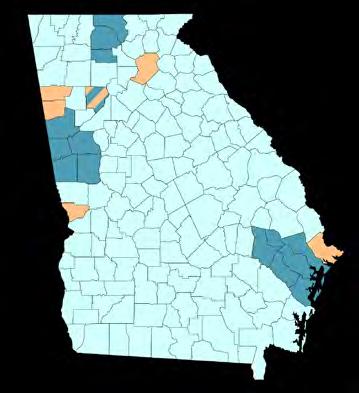
• The CACJ held its annual training conference from September 26-29, 2021. The hybrid format conference hosted 485 attendees onsite in Athens and another 850 online. Attendees had the opportunity to learn new, innovative ideas from their peers and gather information on the latest best practices from around the nation. During the training event, CACJ recognized an inaugural set of model veteran treatment
courts and family treatment courts. These courts will serve as model programs and learning sites for others through 2025.
• During the 2021 Accountability Court Training Conference, 40 coordinators graduated from the inaugural Carl Vinson Institute of Government certified coordinator training program.
• CACJ executed a planned training calendar that included a hybrid training conference, 38 training opportunities, and support for two self-guided, ongoing training opportunities.
• CACJ has received notice of intent to apply for state fiscal year 2023 funding from fifteen (15) implementation courts that wish to begin operations on July 1, 2023. These new implementation programs consist of adult mental health courts, adult felony drug courts, veterans treatment courts, family treatment courts, and juvenile accountability courts.
Inaugural Model Veteran Treatment Courts and Family Treatment Courts
Model Veteran Treatment Courts
Appalachian Circuit Veterans Court, Chief Judge Brenda Weaver
Atlantic Judicial Circuit Veterans Court, Judge Robert L. Russell, III
Cobb County Veterans Accountability And Treatment Court, Judge Latain Kell
Coweta Veterans Treatment Court, Judge John Simpson
Model Family Treatment Courts
Chatham County Family Treatment Court, Judge Tom Cole
Cobb County Family Treatment Court, Judge Jeffrey Hamby
Enotah Family Treatment Court, Judge Jeremy Clough
Hall County Family Treatment Court, Judge Alison Toller
Muscogee County Family Drug Court, Judge Andrew Dodgen
Tallapoosa Family Treatment Court, Judge Laura Wheale

41
COUNCIL OF ACCOUNTABILITY COURT JUDGES
CONNECTED BOARDS, COMMITTEES, COMMISSIONS and COUNCILS
Commission on Dispute Resolution
Tracy B. Johnson, Executive Director; Karlie A. Sahs, Deputy Director godr.org
Leadership
Chairperson
Judge M. Cindy Morris

Commission Members
Justice John J. Ellington
Judge Amanda H. Mercier
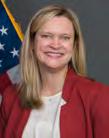
Emily S. Bair, Esq.
Judge Jane C. Barwick
N. Staten Bitting Jr., Esq.
Hon. Rebecca Crumrine Rieder
Judge Clarence Cuthpert, Jr.
Mary Donovan, Esq.
Judge C. Andrew Fuller
Herbert H. (Hal) Gray III, Esq.
Melissa C. Heard, M.S.S.W.
Nicole Woolfork Hull, Esq.
Rep. Rob Leverett, Esq.

Judge Carrie B. Markham
Patrick T. O’Connor, Esq.
Edith B. Primm, Esq.
Judge Renata D. Turner
Randall Weiland
Peggy McCoy Wilson
Mission
The Georgia Commission on Dispute Resolution (GCDR) is a policy-making body appointed by the Supreme Court of Georgia, charged with helping to fulfill its Constitutional mandate to “provide for the speedy, efficient, and inexpensive resolution of disputes and prosecutions” in the judiciary. The Commission does this by managing a statewide system that offers true and effective alternatives to traditional litigation. Those alternatives – mediation, non-binding arbitration, and case evaluation – give Georgia litigants lower-cost choices for resolving their differences, and they help save scarce court resources for those cases that cannot be resolved without a judge or jury.
Highlights
• As of June 30, 2022, there were approximately 2,939 registered neutrals. The partnership between neutrals, court ADR programs, and the Commission creates a comprehensive network that benefits taxpayers, litigants, attorneys, judges, and courts.
•The 2022 Court ADR Program Directors’ Conference was held in Savannah on April 25-27. Important programming for the conference included mediating probate court cases, with presentation assistance by Ms. Ellie Lanier; an overview of a new data collection plan proposal, with discussion led by Mr. Jeffrey Thorpe; and practical tips for cybersecurity led by Mr. Ben Luke.
• The Commission has partnered with the Fulton County Juvenile Court and Dr. Lauren Abramson (Community Transformation in Baltimore, MD) to create a restorative justice pilot project for the court. This pilot project focuses on diverting juvenile cases which involve more serious offenses to a restorative justice process called community conferencing (CC). The community conferencing model
42 JUDICIAL COUNCIL / ADMINISTRATIVE OFFICE OF THE COURTS ANNUAL REPORT FY 2022
GCDR welcomed 3 new members: (L to R) Rep. Rob Leverett, Judge Carrie B. Markham, Judge Rebecca Crumrine Rieder
aims to shift collective values from punishment and exclusion to healing and repair.
• GCDR is continuing its work on updating the Supreme Court’s ADR Rules to better align them with the Georgia Uniform Mediation Act. The GCDR approved the Ad-hoc Rules Committee’s recommendations at the May meeting. These recommendations will guide the GCDR Committees in updating their respective appendices. All revisions will be circulated for public comment prior to submission to the Supreme Court.
• The GCDR Committee on Training and Credentials is currently working on a plan to establish rules and qualifications for community conferencing and CC facilitators as an official ADR process. GODR thanks Chief Presiding Judge Juliette W. Scales; Presiding Judge Renata Turner; Mr. Tim Ezell (Fulton County); Ms. Allison Bantimba (RCA); Dr. Elizabeth Beck (RCA, Georgia State University); Dr. Lauren Abramson; the Office of District Attorney Ms. Fani Willis, Esq.; and other working group members for their support.
•The Commission welcomed three new appointees: The Hon. Rebecca Crumrine Rieder, former Superior Court Judge and current registered neutral; Representative Rob Leverett, Georgia House District 33; and Judge Carrie B. Markham, Coweta County Probate Court.
• The 28th Annual ADR Institute and 2021 Neutrals’ Conference was held via livestream on November 19, 2021. There were 372 attendees in total. Mr. John A. Sherrill received the Eigth Chief Justice Harold G. Clarke Award. The Georgia Supreme Court Commission on Dispute Resolution and the Georgia State Bar Dispute Resolution Section created the Clarke Award in 2013 to honor the memory of the late Supreme Court Chief Justice Harold G. Clarke. This award is to honor those individuals who have made outstanding contributions to dispute resolution in Georgia.
• As a new, ongoing partnership, GODR joined with the Georgia Child Support Commission to host neutral-only child support guidelines & calculator training. The first training was held on June 9, 2021. Subsequent trainings have been held on August 18, 2021 (Lunch and Learn Q&A), April 13, 2022, and May 13, 2022 (Lunch and Learn Q&A).
• As of July 1, a total of eight (8) court ADR programs were utilizing the case management system ScheduleADR.
• GCDR had a representative on the AgLanta Grows-a-lot program advisory board. This representative assisted the program in developing a system for conflict management, which included training AgLanta participants to mediate conflict within the Grows-a-lot program community. AgLanta is the urban agriculture workforce behind the City of Atlanta’s One Atlanta Office and Department of City Planning. Readers can learn more about AgLanta at https://www.aglanta.org/.
• GCDR Chair Hon. M. Cindy Morris gave commendation to the Georgia Uniform Mediation Act (effective July 1, 2021) working group members and their supporters in service to the expansion of mediation in Georgia at the Commission meeting on August 4, 2021.

43 COMMISSION ON DISPUTE RESOLUTION
GUMA Working Group: Shelby Guilbert, Esq.; Tracy B. Johnson; Mary Donovan, Esq.; Hon. Charles E. Auslander III; Dr. Timothy Hedeen; Hon. M. Cindy Morris; Stephen McKinney, Esq.; Christine Butcher Hayes; Rep. Rob Leverett; Hon. Jane C. Barwick; Stacey Hornsby, Esq. Not pictured: Laura E. Ashby, Esq., Sen. John F. Kennedy, Russell N. Sewell, Jr., John A. Sherrill, R. Wayne Thorpe, Esq., and Douglas H. Yarn, Esq
Committee on Justice for Children
Authorized and Created by the Supreme Court
Staff to Committee: Diana Rugh Johnson georgiacourts.gov/j4c/ Name Role Location Position
David E. Nahmias Supreme Court Justice
Charlie Bethel Supreme Court Justice
Statewide Chair
Statewide Vice Chair
Kim Anderson Attorney Fulton County Member
Mandi Ballinger State Representative
Candace Broce Commissioner, Georgia DHS
Emma Brown-Bernstein Attorney, Public Defender
Bartow County Member
Statewide Member
Atlanta Circuit Member
Jerry Bruce Director, Georgia Office of Child Advocate Statewide Member
W. Bradley Bryant Georgia Student Finance Commission
Lindsay H. Burton Juvenile Court Judge
Christopher Carr Attorney General
Stephen Louis A. Dillard Court of Appeals Judge
Chuck Efstration State Representative
Louis Erste Georgia Department of Education
Laurie-Ann Fallon Special Assistant Attoreny General
Darice Good Attorney
Britt Hammond Superior Court Judge
Render Heard, Jr.
Juvenile Court Judge
Amanda Heath Superior Court Judge
Dr. Sharon L. Hill Georgia State University
Warner Kennon Juvenile Court Judge
R. Michael Key Juvenile Court Judge
Jennifer King Executive Director, Georgia CASA
Fulton County Member
Hall County Member
Statewide Member
Statewide Member
Gwinnett County Member
Statewide Member
Bartow County Member
Fulton County Member
Toombs Circuit Member
Tift County Member
Augusta Circuit Member
Fulton County Member
Chattahoochee Circuit Member
Coweta Circuit Member
Statewide Member
Nealie McCormick Georgia Council on American Indian Concerns Mitchell County Member
Mary Margaret Oliver State Representative
Tyrone Oliver Georgia Department of Juvenile Justice
Jacqueline L. Payne Atlanta Legal Aid Society
Gregory C. Price
Juvenile Court Judge
Freddie Powell Sims State Senator
Juanita Steadman ED of Together Georgia, retired juvenile judge
Blake Tillery State Senator
Michael Waller Georgia Appleseed Center for Law and Justice
Robert Wright Bishop, Episcopal Diocese, Atlanta
82nd District Member
Statewide Member
Atlanta Circuit Member
Rome Circuit Member
12th District Member
Cobb Circuit Member
19th District Member
Ocmulgee Circuit Member
Fulton County Member
44 JUDICIAL COUNCIL / ADMINISTRATIVE OFFICE OF THE COURTS ANNUAL REPORT FY 2022
Mission:
Striving to improve justice for children and families within the child welfare legal system.
Highlights:
• The Committee welcomed new Court Improvement Program Director Diana Rugh Johnson on August 1, 2021. Ms. Johnson is a Child Welfare Law Specialist with over 15 years of experience including 6 years as a Judge Pro Tempore in the Dekalb County Juvenile Court.
• Georgia’s fifth annual Child Welfare Summit was held on November 17-19, 2021. The Summit, sponsored by the Committee on Justice for Children, the Division of Family and Children Services (DFCS), Office of the Child Advocate (OCA), and Georgia CASA, welcomed 402 onsite attendees and 233 virtual attendees consisting of juvenile court judges, Special Assistant Attorneys General (SAAGs), parent attorneys, child attorneys, guardians ad litem, case managers, service providers, foster parents, and parents and youth with lived experience. Offering virtual attendance increased the geographical reach of the Summit and allowed the content to remain available on-demand to all attendees for 90 days following the close of the Summit.
• In February, Georgia enrolled as a pilot site for the Judicial, Court, and Attorney Measures of Performance (JCAMP) project with the Capacity Building Center for Courts (CBCC) and spent four months helping the CBCC develop and test methods for collecting data from court hearings, case files, administrative sources, and stakeholder surveys. When the pilot project concluded, the Committee began tailoring the JCAMP materials and methods to meet Georgia’s need for statewide juvenile court data.
The Committee continues to support and administer the Cold Case Project, a joint project with DFCS and OCA. The Project uses a computer model to identify children in foster care whose cases are not moving toward permanency
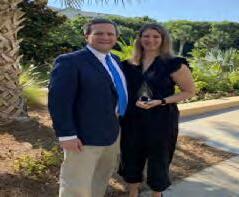

and convenes stakeholders to identify and overcome barriers to permanency.
• The Committee hosted a meeting of Georgia’s Child Welfare Law Specialists (CWLS) on September 16-17, 2021. Georgia now has 63 attorneys and 7 judges who are CWLS certified. The Committee remains focused on the recruitment and retention of CWLSs and is offering financial assistance with application costs and annual renewal and recertification fees.
• The Committee provided stakeholder education and collaboration opportunities through two Court Improvement Initiative meetings on August 19-20, 2021 and March 3-4, 2022, and sponsorship of county-level stakeholder meetings across the state.
• The Court Process Reporting System (CPRS) remains a top priority. DFCS estimates that using CPRS to upload court orders at the county level saves the State some $4 million dollars each year, the amount typically lost in federal IV-E reimbursements due to the unavailability of court orders when the state is audited by our federal partners.
• The Chief Justice P. Harris Hines Award, which recognizes excellence in the child welfare system, is the Committee’s most beloved project. Each year the Hines Award honors one Georgia DFCS case manager and one attorney for their work in the child welfare system. The 2022 Hines Awards were presented by Justice Charlie Bethel at a special ceremony during the State Bar Annual Meeting to attorney Jennifer Cline of Rockdale County and case manager Katie Hamm of Hall County.
45
COMMITTEE ON JUSTICE FOR CHILDREN
Committee Vice Chair Justice Charlie Bethel with 2022 Hines Award Winners Jennifer Cline and Katie Hamm.
•
CONNECTED BOARDS, COMMITTEES, COMMISSIONS and COUNCILS
Georgia Child Support Commission
Staff to Commission: Elaine Johnson, Noelle Lagueux-Alvarez, and Latoinna Lawrence
Created by O.C.G.A. § § 19-6-50 et seq., staffed by JC/AOC through interagency agreement with DHS
https://csc.georgiacourts.gov/
R. Michael Key
Charles Clay
Lisa Colbert
Kathleen Connell
Lisa C. Jones
Shawn Ellen LaGrua
Emory L. Palmer
Regina Quick
Christina L. Scott
Brian Strickland
Dr. Roger Tutterow
Connie L. Williford
Mission
The Child Support Commission was created by statute for the purpose of collecting information and studying data related to awards of child support and to create and revise the child support obligation table. To maintain effective and efficient child support guidelines that will serve the best interest of Georgia’s children, the Commission conducts comprehensive reviews of the child support guidelines and economic conditions while bearing in mind the changing dynamics of family life and all other relevant matters.
The Commission staff trains judges, attorneys, mediators, staff of the Division of Child Support Services (DCSS), and the public around the state; develops and maintains the state’s child support calculator and worksheets; maintains websites for the Child Support Commission and for Georgia’s Income Deduction Order process in private child support actions; and proposes legislation when it deems an amendment to the guidelines statute is necessary.
46 JUDICIAL COUNCIL / ADMINISTRATIVE OFFICE OF THE COURTS ANNUAL REPORT FY 2022
Name Role Location Position
Juvenile
Coweta Circuit Chair
Court Judge
Attorney Fulton County Member
Superior
Eastern County Member
Court Judge
Attorney Cobb County Member Houston
State Representative 117th District Member
State
10th District Member
Gaines
Emanuel Jones
Senator
Juvenile
Southwestern Circuit Member
Court Judge
Supreme
Statewide Member
Court Justice
Superior
Coweta Circuit Member
Court Judge
Attorney Atlanta Member
State Representative 97th District Member
Bonnie Rich
Attorney Atlanta Member
State Senator 17th District Member
Kennesaw State University Member
Economist
Superior
Macon Circuit Member
Court Judge
Highlights
• The Commission had two successful deployments of the Child Support Calculator in early January 2022. The first deployment was to update security for the calculator, and the second was to update the Schedule B selfemployment taxes paid formula as required in OCGA 19-6-53(a)(7).

• Staff trained and supported PAC coordinators on using the database to produce statistical evidence of the efficacy of those courts. Staff also coordinated a transfer of the PAC database to the Division of Child Support Services (DCSS) by September 30, 2022. Staff has identified the next six courts for evaluation: the Atlanta, Dublin, Gwinnett, Mountain, Pataula, and Rockdale Judicial Circuits.
• Staff began the 2022 case sampling and economic review by gathering orders from 15 counties: Appling, Clayton, Early, Echols, Elbert, Fannin, Fayette, Forsyth, Glascock, Glynn, Houston, Paulding, Rockdale, Stewart, Troup, and Ware. The court orders, child support worksheets, and other related documents were gathered from those counties for September and October 2021, with the cooperation of the superior court clerks. Staff worked directly with the Division of Child Support Services (DCSS) to secure their orders, worksheets, and payment summaries. The AOC contracted with Dr. Jane Venohr,
Center for Policy Research, Inc. to conduct the 2022 Economic Study. Two productive listening lessons were held on August 26 and September 23 to gather public comments.
• The Commission may submit a bill during the 2024 legislative session based on the results of the 2022 economic study of the child support guidelines and basic child support obligation table.
• Online training sessions were held at least once a month were and very well attended. In addition, staff has prepared training videos available on the Child Support Commission website for parents (self-represented litigants). Staff also coordinated with the Georgia Office for Dispute Resolution and provided child support calculator training to mediators and held a question and answer session for neutrals.
47
GEORGIA CHILD SUPPORT COMMISSION
Staff training Division of Child Support Services staff in March.
CONNECTED BOARDS, COMMITTEES, COMMISSIONS and COUNCILS
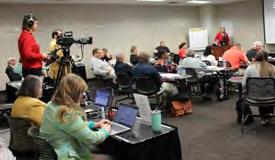

Institute of Continuing Judicial Education
Lynne Moore Nelson, Executive Director
Established by order of the Supreme Court of Georgia
https://icje.law.uga.edu/
Judge Katherine “Katie” Lumsden
Dean Peter “Bo” Rutledge
Judge William P. Bartles
Judge Bonnie Chessher Oliver
Justice Verda M. Colvin
Dean Mary Anne Bobinski
Cynthia H. Clanton, Director
Dean Jace Gatewood
Kyemeshia T. Gibson
Judge Elizabeth Gobeil
Judge Megan Kinsey
Judge Patty Walters Laine
Brad Marsh
Chief Judge Matthew McCord
Judge A. Gregory Poole
Dean LaVonda Reed
Judge Allison Barnes Salter
Interim Dean Karen J. Sneddon
Mission
The Institute of Continuing Judicial Education of Georgia (“ICJE”), established in 1978, provides continued education and training since its founding and is a professional education consortium of the Georgia Judicial Branch, the State Bar of Georgia, and Georgia’s ABAaccredited law schools: Emory University School of Law; Georgia State University College of Law; Mercer University School of Law; the University of Georgia School of Law; and, Atlanta’s John Marshall Law School. ICJE’s mission is to provide professional development and judicial information services to Georgia judges and court personnel so that they are equipped to provide timely, fair, and impartial court services to the public.

Courts June 30, 2023
– Ex Officio
Courts
University School of Law
30, 2025
– Ex Officio
48 JUDICIAL COUNCIL / ADMINISTRATIVE OFFICE OF THE COURTS ANNUAL REPORT FY 2022
Name Role Representing Term Ends
Chair Superior Courts June 30, 2023
Vice-Chair University of Georgia School of Law N/A – Ex Officio
Secretary/Treasurer Juvenile Courts June 30, 2025
Immediate Past Chair Superior Courts N/A – Immediate Past Chair
Liaison Member Supreme Court of Georgia N/A Liaison Member
Board Member Emory University School of Law N/A – Ex Officio
Board Member Judicial Council of Georgia N/A – Ex Officio
Board Member Atlanta’s John
School of Law N/A – Ex Officio
Marshall
Board Member Superior Court Clerks June 30, 2025
Board Member Court of
of
June
Appeals
Georgia
30, 2023
Board Member Magistrate Courts June
2024
30,
Board Member Probate Courts June
30, 2025
Board Member State Bar of Georgia June 30, 2024
Board Member Municipal Courts June
30, 2024
Board Member Superior
Board Member Georgia
N/A
State University School of Law
Board Member State
June
Board Member Mercer
N/A
ICJE facilitated judicial and court personnel trainings for every class of Georgia’s trial courts in FY2022.
Like most global institutions, ICJE was impacted in FY2022 by the continuing effects of COVID-19. The work of ICJE includes serving its constituents by securing training venue locations, supporting educational apparatus meetings for each class of court, providing speaker support for all programming, serving as an official record training depository for some classes of court, producing educational publications, providing monthly financial reporting to all classes of court, and facilitating the administrative support for training seminars.
Georgia’s continuing judicial education offerings were altered in FY2022 to provide program delivery formats that respected COVID-19 safety protocols for its 15 constituent groups and classes of court. In July of 2021 , ICJE staff returned to facilitating live, on-site programming while continuing to offer taped replay, Zoom, a hybrid combination of live and taped replay, a hybrid combination of live and simulcast, and a hybrid combination of live, taped replay, and simulcast to every requesting court council.
In FY2022, 39 programs were delivered –37% were in-person with no taping, 34% were online only, and 29% were hybrid either live and taped or simulcast replay. Despite the logistical challenges, ICJE surpassed its annual goal of delivering 50,000 continuing educational units (“CEU”) and delivered 81,054 CEUs to 5,388 members of Georgia’s judiciary branch including staff. ICJE’s largest training in FY2022 was the Council of Accountability Court Judges of Georgia’s September 2021 Annual Training Conference in Athens with over 1,300 learners.
FY2022 financial highlights included ICJE’s 9% administrative cost increase from FY2021 to FY2022 due to costs related to COVID logistics and inflation. Because State appropriated funds do not cover its operations, ICJE constituent groups are assessed a “shared office overhead” fee. The fee is based on the ratio of each
constituent group’s cost before overhead allocation to the total costs of all the groups before overall allocation. ICJE appreciated the State's approval of its FY2023 enhancement for a mission-critical position of a new Training Assistant position to bring its total staff members to 8 employees funded by the State. The new position assists with managing the 34% increase in constituents that ICJE serves.
ICJE’s management transitioned in FY2022 when Doug Ashworth announced in August of 2021 that he was retiring in January 2022. The Board of Trustees approved and hired Lynne Moore Nelson to serve as ICJE’s third Executive Director. Mrs. Nelson has an undergraduate degree from Howard University and a Juris Doctorate from Mercer University School of Law. She practiced law in Minnesota before spending 18 years in Chicago working at several City of Chicago agencies including 14 years at the Chicago Public Schools in a variety of executive management roles - including First Assistant Chief of Staff to the CEO, Chief of Staff to the Chief Education Officer, and Deputy Chief of Operations/Chief of Staff for its largest department, Special Education. When she returned to Georgia, she served as Chief of Staff to Fulton County’s District Attorney for 4 years and Court Administrator for the Fulton County Magistrate Court for a year and a half. Mrs. Nelson’s background reflects a unique intersection of law, public school education, and general public sector management. Mrs. Nelson’s goals for ICJE include securing additional operational funding, modernization of ICJE’s program management system, and increased speaker support that resonates with all learners. Overall, ICJE’s vision to become the premier judicial education provider is within its reach!
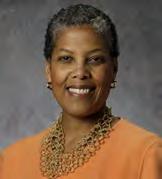
49
Highlights Institute of Continuing Judicial Education
Lynne Moore Nelson Executive Director
Reports from Appellate Courts and Trial Court Councils
Supreme Court of Georgia
gasupreme.us
The 2022 fiscal year was a period of significant change but also of hard work as usual for the Supreme Court of Georgia.
Most notably, the Court bid farewell to former Chief Justice David E. Nahmias, who announced in February that he was stepping down from the bench after more than 12 years of dedicated service. The Court voted the next month to name Presiding Justice Michael P. Boggs as the next Chief Justice, with Justice Nels S.D. Peterson taking on the role of Presiding Justice. The Court also welcomed former Court of Appeals Judge Andrew A. Pinson, who was appointed Justice by Gov. Brian Kemp to fill Chief Justice Nahmias’s unexpired term.
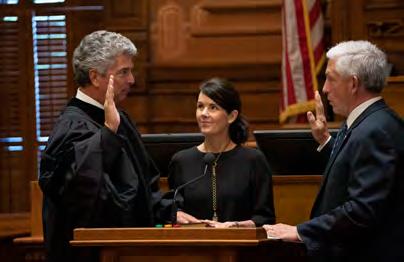
In his February 2022 State of the Judiciary address before the Georgia General Assembly, Chief Justice Nahmias emphasized how courts of all classes around the state have worked diligently to remain as functional as possible in the wake of a pandemic and to ensure that citizens have access to justice. That work is ongoing, including at the Supreme Court, which has leveraged technology when necessary to keep the wheels of justice turning.

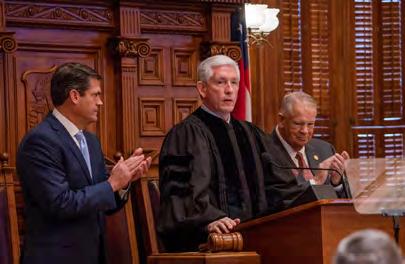
While the Court briefly returned to remote videoconference oral arguments in January 2022 in response to increasing COVID-19 case counts amid the Omicron variant surge, it has since returned fully to in-person proceedings with great success. The Court will continue to provide opportunities for counsel to argue remotely, when needed.
Another busy year
The Court took in 1,326 new cases and effectuated 1,218 dispositions in fiscal year 2022. Of those cases, 436 were petitions for certiorari, and another 322 were direct and cross appeals.
The Court also issued 235 opinions and heard oral arguments in more than 75 cases.
Despite predictions to the contrary, when the Legislature transferred some of the Court’s jurisdiction to the Court of Appeals in 2017, the
51
Above: Chief Justice Nahmias delivered the State of the Judiciary Address on February 8, 2022.
SUPREME COURT OF GEORGIA
Below: The Investiture of Chief Justice Boggs and Presiding Justice Peterson on July 18, 2022.
Supreme Court’s workload has not substantially changed. Although the number of new cases filed during the pandemic was lower than the number filed pre-pandemic, this is attributable to the temporary suspension of all litigation deadlines in all state courts under the now-expired declaration of a statewide judicial emergency. Emerging from the pandemic, petitions seeking certiorari review of decisions of the Court of Appeals—cases traditionally more complex and presenting some of the toughest questions for the Court to decide—has increased by 10 percent. In addition, direct appeal matters have increased by almost 25 percent, and the Court continues to address a two-fold increase in new matters dealing with attorney discipline.
As the trial courts continue to work back towards regular operations, the data suggests that the Supreme Court’s caseload will substantially increase. Given our constitutional obligation to resolve these cases within two terms of court, decisions cannot be postponed. And given the constitutional directive that the decisions of the Supreme Court bind all other Georgia courts as precedents, the quality of the decisions cannot suffer.
Making progress
To help courts address the impending backlog of cases, especially those cases involving serious, violent felonies, Gov. Kemp committed $96 million in federal American Rescue Plan Act (ARPA) money to the judiciary. Then-Presiding Justice Boggs was named Chairman of the ad hoc committee charged with overseeing applications for and awards of those funds.
In the program's first year, the committee has awarded grants to 42 of the state’s 50 judicial circuits, totaling more than $44 million. Requests from judicial circuits have included funding for temporary personnel, such as senior
judges, assistant district attorneys, security staff, and court reporters, as well as funding for rental of temporary spaces to hold jury selection and trials.
The Judicial Council Standing Committee on Access to Justice was chaired by Justice Verda Colvin, who has made field trips to clinics and meetings around the state and held a retreat in partnership with the State Bar of Georgia's Access to Justice Committee in April 2022. During that retreat, progress was acknowledged and new priorities were established, such as the creation and adoption of simpler uniform court forms, support for legal self-help centers and record-restriction work, increased CLE opportunities around A2J issues, and better communication internally and externally.
Celebrating history
The Court celebrated its 175th Anniversary by partnering with the Georgia Legal History Foundation to host a two-day seminar in
52 JUDICIAL COUNCIL / ADMINISTRATIVE OFFICE OF THE COURTS ANNUAL REPORT FY 2022
REPORTS FROM APPELLATE COURT AND TRIAL COURT COUNCILS
Judicial Circuits awarded funds by the Ad Hoc Committee for ARPA Funding in CY22.
December inside the Nathan Deal Judicial Center. Highlights of the seminar included a fireside chat with former Chief Justices Carol Hunstein, Leah Ward Sears, and Norman S. Fletcher and a re-arguing of the historic Three Governors Cases, featuring veteran appellate attorneys Michael B. Terry of Bondurant Mixson & Elmore and W. Ray Persons of King & Spalding, as well as an introduction by the University of Georgia’s Richard B. Russell Professor Charles S. Bullock III. Video recordings of those events, as well as a recap of the Court’s history, are available on the Court’s website at gasupreme.us/175th/.
The Court also was able to return to many of its previously long-held traditions, including public tours, in-person attorney admissions to the Bar of the Supreme Court of Georgia, two portrait unveilings—one for the late Chief Justice P. Harris Hines, held in May, and another for retired Chief Justice Carol Hunstein, held in June—and the presentation of the Court’s Amicus Curiae Award to retiring Atlanta Legal Aid Society Director Steve Gottlieb, also in in June.

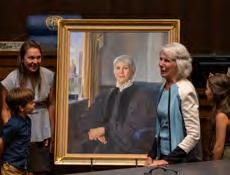
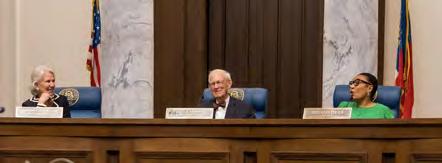
Bar Admissions
As usual, the Board of Bar Examiners administered two bar exams in FY22. Nearly 1,200 applicants sat for the July 2021 Bar Exam, which was administered remotely on applicants’ laptops. Seven hundred and seventy-two of those applicants passed the exam. The overall pass rate of 64.4 percent was slightly lower than the 65.8 percent pass rate for the last July Bar Exam in 2019. The decrease in the overall pass rate was driven by a substantial decrease in the pass rate for repeat test-takers, which dropped to 14.1 percent. However, the pass rate for first-time test takers increased slightly to 79.9 percent.
In February 2022, 488 applicants sat for the Bar Exam, which was the first exam to be offered in person (at the Georgia International Convention Center) since the start of the pandemic. Of those, 245 passed the exam. That is slightly higher than the 237 applicants who passed the February 2021 Bar Exam, and the overall pass rate of 50.2 percent for the February 2022 Bar Exam was the highest for a February exam since February 2017. The increase in the pass rate was driven by a significant increase in the pass rate for first-time test takers and a smaller increase in the pass rate for applicants who had taken the exam only one or two times previously.
Looking ahead
The Court is looking forward to resuming the practice of off-site special sessions in which the Court hears oral arguments in locations outside of its courtroom in downtown Atlanta for the purpose of giving the public greater access to the Court. The first session was held in October 2022 at the Augusta-Richmond County Municipal Building.
53 SUPREME COURT OF GEORGIA
Top Row: The portrait unveilings of former Chief Justices Hunstein and Hines.
Bottom, L to R: Former Chief Justices Hunstein, Fletcher, and Sears participate in a panel at the Court's 175th Anniversary (photo by Erik Voss)
Court of Appeals of Georgia
Mission
Sitting in five three-judge panels, the Court of Appeals handles the majority of appeals in Georgia. The court is responsible for assuring that the rule of law applies equally to all appeals and that they are resolved correctly and promptly. As an appellate court with statewide jurisdiction, the Court of Appeals shares responsibility with the Supreme Court for producing a clear and consistent body of case law that can be relied upon throughout the state.

Highlights
• Completely Revised Website for Better User Experience
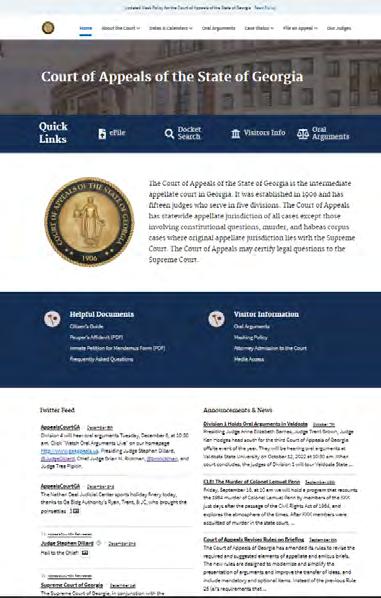
• Continued to Deepen Cybersecurity Defenses
• Planned Offsite Oral Argument Sessions

• Improved Public Awareness through Social Media
• Expanded Access to Electronic Records
• Began planning CLE about the 1964 murder of Lt. Col. Lemuel Penn
54 JUDICIAL COUNCIL / ADMINISTRATIVE OFFICE OF THE COURTS ANNUAL REPORT FY 2022
gaappeals.us REPORTS FROM APPELLATE COURTS AND TRIAL COURT COUNCILS CONTINUED
Cobb County Superior Court Judge Mary Staley Clark and artist Ross Rossin unveil a portrait of the late Court of Appeals Judge Debra Halpern Bernes.
The Court of Appeals unveiled its new website in FY2022, at http://gaappeals.us.
Governor Brian Kemp appointed now-Justice Andrew Pinson to the Supreme Court of Georgia, and appointed former Superior Court Judge Ben Land to the Court of Appeals.
First Row, L to R:
Christopher J. McFadden, Presiding Judge
Sara L. Doyle, Presiding Judge
Anne Elizabeth Barnes, Presiding Judge
Brian M. Rickman, Chief Judge
M. Yvette Miller, Presiding Judge
Stephen Louis A. Dillard, Presiding Judge
Amanda H. Mercier, Vice Chief Judge
Second Row, L to R:
Andrew A. Pinson*, Judge
Kenneth B. Hodges, III, Judge
Elizabeth Gobeil, Judge
Clyde L. Reese, Judge
E. Trenton Brown, III, Judge
Todd Markle, Judge
John A. "Trea" Pipkin, III, Judge
Herbert E. Phipps, Senior Judge
FY 2022 COURT OF APPEALS BY THE NUMBERS
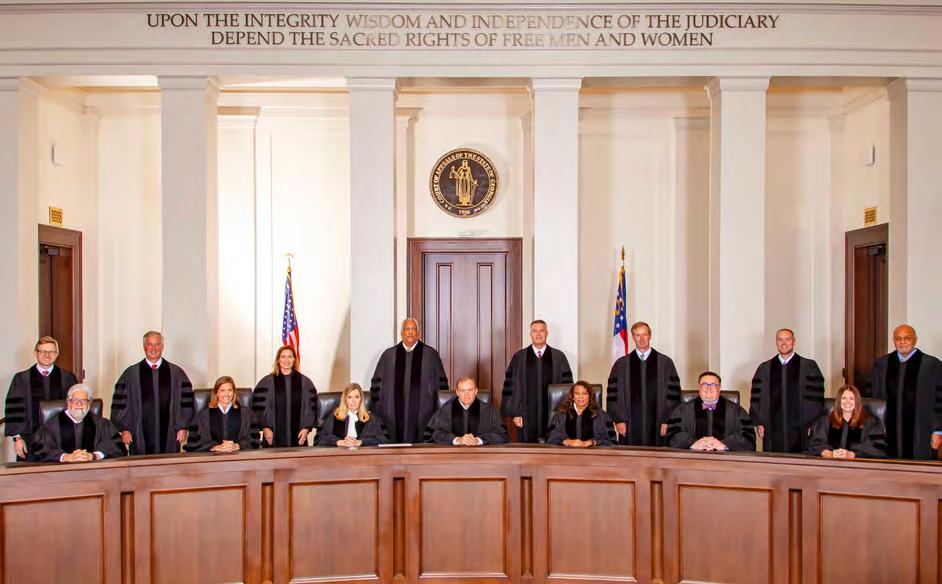
2,506
2,660
MORE THAN
EACH JUDGE WAS ASSIGNED MORE THAN 127 DIRECT APPEALS AND REVIEWED MORE THAN 254 ADDITIONAL APPEALS ASSIGNED TO OTHER JUDGES
NEW FILINGS: 1,758 DIRECT APPEALS 688 APPLICATIONS 60 EMERGENCY MOTIONS
FILINGS DISPOSED OF: 1,905 APPEALS DECIDED 1,133 OPINIONS ISSUED 131 APPEALS AFFIRMED VIA RULE 36 641 APPEALS DECIDED VIA ORDER 691 APPLICATIONS DECIDED 64 EMERGENCY MOTIONS DECIDED
75 WRITTEN OPINIONS PER JUDGE
*Appointed to the Georgia Supreme Court in February 2022.
REPORTS FROM APPELLATE COURTS AND TRIAL COURT COUNCILS CONTINUED
Georgia State-wide Business Court
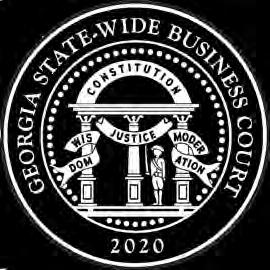
www.georgiabusinesscourt.com/
Mission
To lower costs, improve the efficiency of all courts, and promote predictability of judicial outcomes in certain complex business disputes for the benefit of all citizens of this state.
Overview
The State-wide Business Court has jurisdiction over claims involving the Uniform Commercial Code, the Georgia Uniform Securities Act, the Georgia Business Corporation Code, Georgia Trade Securities Act, and other business disputes. The court also has supplemental jurisdiction over all related pending claims. Absent equity jurisdiction, the court’s jurisdiction is limited to claims greater than $500,000–except for commercial real estate, which will be limited to claims greater than $1 million. The cost to file a case in the court is $3,000. For the same fee, qualifying cases may be transferred from state courts to the court with the consent of the parties.

56 JUDICIAL COUNCIL / ADMINISTRATIVE OFFICE OF THE COURTS ANNUAL REPORT FY 2022
The official seal of the Georgia State-wide Business Court, front and back.
Highlights
• The court successfully held its first jury trial in April 2022 in the Nathan Deal Judicial Center.
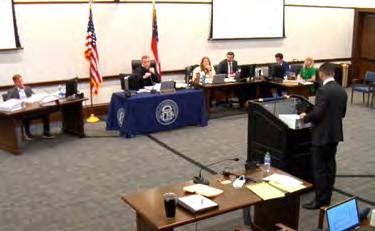
• Created an archive of oral arguments available to the public at georgiabusinesscourt.com/oral-arguments/. In FY22, oral arguments were held 39 times.
• Leadership change: In June 2022, Judge Walter Davis announced that he would return to private practice. In August 2022, Judge William "Bill" Hamrick, III, was announced to be his successor and sworn in on September 26, 2022.
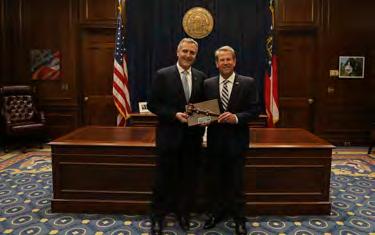

57
GEORGIA STATE-WIDE BUSINESS COURT
The first jury trial held by the Georgia State-wide Business Court.
The swearing in of new Georgia State-wide Business Court Judge William "Bill" Hamrick, III, on September 26, 2022.
Outgoing Judge Walter Davis was presented a gavel by Governor Kemp in appreciation of his service to the Court.
Council of Superior Court Judges
Executive Director: Shannon Weathers georgiasuperiorcourts.org
Vision: Judicial Excellence; Accessible, Effective, and Efficient Superior Courts.
Mission:
The Council of Superior Court Judges’ mission is to provide leadership and support to preserve the ability of the Courts to meet their constitutional and statutory responsibilities and further the administration of justice while functioning as a liaison with other courts and the other two branches of Government.
The Council provides payroll and travel reimbursements; budget administration and accounting; leave entry, benefit coordination, and other human resources needs for all judges and their state-paid staff; and management of all superior court statewide accounting functions.
The Council also provides legal support for required publications such as the Uniform Rules for Superior Courts and Pattern Jury Instructions; statewide legal support for judges handling death penalty habeas corpus cases; logistics for seminars and meetings; and numerous other critical statewide functions for superior courts.
The Council office also serves as the hub for legislative tracking, meeting coordination, and monitoring during the legislative session.
Leadership: President
Art L. Smith, III
Chattahoochee Judicial Circuit
President Elect
John E. Morse, Jr.
Eastern Judicial Circuit
Secretary Treasurer
Ann Harris
Cobb Judicial Circuit
Immediate Past President

J. Wade Padgett
Columbia Judicial Circuit
Goals:
The Council thanks Governor Brian Kemp and the General Assembly for the pay increase for judges and other state employees.
The Council will seek legislation to improve the personal security of our judges and their families, to amend the court reporter statutes to permit all superior court judges to appoint more than one court reporter, and to authorize post retirement benefit adjustments for judges who became members of the Judicial Retirement System on or after July 1, 2009.
58 JUDICIAL COUNCIL / ADMINISTRATIVE OFFICE OF THE COURTS ANNUAL REPORT FY 2022
REPORTS FROM APPELLATE COURTS AND TRIAL COURT COUNCILS CONTINUED
Immediate Past President Judge Wade Padgett being recognized for his service to the Council by President Chief Judge Arthur Smith.
Highlights:
COVID Response: The Council thanks all superior court judges for adapting to manage their caseloads and maintain public access while protecting the public and court personnel. The Council has worked with the Supreme Court and judges of other classes of court to revise the Uniform Rules of Superior Court to facilitate court proceedings by electronic means within constitutional and legal limits. The Council is grateful to Governor Kemp for providing federal ARPA funding to the judiciary which has assisted our judges in the performance of their duties as Georgia has emerged from the pandemic.
Pattern Jury Instructions Rewrite Initia-

tive: The Council continues the process of rewriting many of the suggested pattern jury instructions in plain English. This initiative is intended to better assist judges in the instruction of jurors by promoting a clear and concise presentation of the law to citizens serving on a jury. New or revised charges have already been published regarding Combat by Agreement, Concealing the Death of Another, Aggravated Assault on Public Safety Officer, Aggravated Battery, and Stalking. The Council will soon publish new charges regarding Vehicular Homicide and Firearms Offenses as well as a new Grand Jury charge.
New Judges’ Orientation: Judge Wade Padgett and former Judge LaTain Kell have trained a majority of the active superior court judges through the New Judges’ Orientation program. The goal is to prepare new judges for success as they take the bench. Criminal topics include pretrial issues, presentation of evidence, submitting the case to the jury, sentencing, merger, and motions for new trial. Civil topics include domestic relations, pretrial motions, discovery disputes, attorney fees, verdict, and post-trial issues. Other topics include contempt, recusal, and the Judicial Qualifications Commission. Judge Padgett and former Judge Kell also co-host the free “Good Judge-ment” podcast, which covers educational discussions relevant to the judiciary and legal system.
Emory Findley Award: Each year the Council recognizes a deserving judge with the distinguished Emory Findley Award for Outstanding Judicial Service.
Senior Judge David Emerson of the Douglas Judicial Circuit, a past president of the Council, was the recipient this year. Judge Emerson was recognized for his leadership and vision of improving superior courts throughout Georgia. Judge Emerson also served as the long-time chair of the Judicial Council Judicial Workload Assessment Committee, the Vice-Chair of the Judicial Council Court Technology Committee, and a member of the Board of Directors of the Georgia Technology Authority.
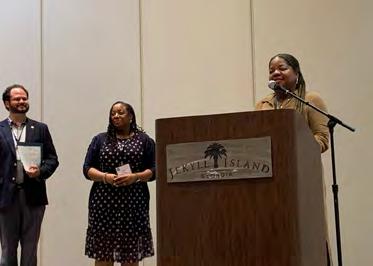
59
Judge David E. Emerson
COUNCIL OF SUPERIOR COURT JUDGES
Judge Bert Guy and Chief Judge Asha Jackson present Judge Nora Polk with a New Judge Resolution.
Council of State Court Judges
Executive
Director: Bob Bray
georgiacourts.gov/statecourt/
Leadership:
President
Judge Alvin T. Wong, DeKalb County
President Elect
Judge R. Violet Bennett, Wayne County
Secretary
Judge John K. Edwards, Jr, Lowndes County
Treasurer
Judge Jeffrey B. Hanson, Bibb County
Past President
Judge Wesley B. Tailor, Fulton County
Mission and Goals:
“Impartial Courts - Judicial ExcellenceAccessible and Efficient Justice.” The Council consists of 131 State Court active judges, who serve in 72 counties, and 57 Senior Judges and State Court Judges Emeritus. Each year the Council develops a Strategic Business Plan to further its mission toward the improvement of State Courts, the quality and expertise of its judges, to maintain the impartiality of the judiciary and to ensure the fair, efficient administration of justice. The five Strategic Objectives of the Council are to:
1. Support the State Courts
2. Enhance Effectiveness and Continuity of our Council
3. Support the Judiciary as a whole
4. Foster Relationships within the Judiciary and with other branches of government
5. Serve, inform and interact with the public
Highlights:
• The Council, working in conjunction with the Georgia Trial Lawyers Association, succeeded in the passage of House Bill 620 which clarifies the process of when a conservator is required to be appointed in cases involving settlements with minors. The new legislation distinguishes the differences between a “gross settlement” and “net settlement” and how conservators are appointed.
• After conducting a caseload study for the State Court of Gwinnett County, local legislators successfully introduced House Bill 1570 to create a seventh Judgeship. The Governor will make an appointment for this new position by January 1, 2023.
• Several State Courts have received State and Federal grants under the American Rescue Plan Act (ARPA) to assist courts with ways to work on civil and criminal case backlogs created by the suspension of Jury Trials during the Judicial Emergency resulting from social-distancing protocols to halt the spread of COVID-19. State Courts found creative ways to continue operating during the pandemic. The State Court of Cherokee County was featured in an 11 Alive TV newscast entitled Justice al fresco: Georgia’s Parking Deck Courtroom. The State court had started using their parking deck at the courthouse to conduct in-person court proceedings. “Three times a week, Cherokee County’s “deck court” commandeers several hundred square feet of the courthouse's cavernous lower parking deck. The County has installed temporary security checkpoints, added a bomb-sniffing dog – and added instructions for defendants to stay in their cars until their cases are called by phone.”
60 JUDICIAL COUNCIL / ADMINISTRATIVE OFFICE OF THE COURTS ANNUAL REPORT FY 2022
REPORTS FROM APPELLATE COURTS AND TRIAL COURT COUNCILS CONTINUED
• A recent article in the Fulton County Daily report highlighted the work of State Court of Fulton County Chief Judge Susan Edlein who had continued to keep court cases moving in her court since April utilizing technology to conduct virtual proceedings. Later, the court began incorporating technology with in-person proceedings to create a hybrid process to keep cases moving.
• In addition to rigorously following the CDC guidelines, the State Court of Spalding County was aggressive in utilizing new technologies. The Court allowed hybrid trials where it was possible and accommodated any combination of individuals, present or virtual, in the same hearing. All individuals were encouraged to appear virtually or in-person as they preferred. The Court also live-streamed all court sessions on Facebook so that anyone, anywhere, could watch what the court was doing without needing to physically appear in the courtroom.
• During FY 2022, as CDC guidelines eased, the Council offered its members the choice of attending the Fall and Spring Training Conferences in hybrid formats where Judges could participate by attending in-person or by remote access. Judges embraced the ability to be together in-person and share their experiences of holding court during the Judicial Emergency.
• The American Bar Association Specialized Courts Section recognized State Court of DeKalb County Judge Ronald Ramsey who serves as Chair of the National Conference of Specialized Court Judges. The mission of this group is to be a representative, educated, and sensitive judiciary providing equal justice under the law and to assist judges in meeting challenges facing the judiciary.
• On April 5, 2022 a tornado struck the Bryan

County Courthouse during the day and caused extensive damage. The courthouse and the courthouse annex were heavily damaged causing the courthouse to be closed for repairs and renovations Fortunately, the people in the courthouse were able to shelter safely in the courthouse vault as the tornado hit the building, and no one was hurt.
• Wayne County implemented its first Junior Police Academy and visited State Court Judge Vi Bennett to learn about the Judiciary.
• Fulton County State Court Judge Patsy Y. Porter was presented the Ogden Doremus/ Kent Lawrence Award. The award is given to a state court judge who has achieved the highest level of respect from his or her peers as being a judge recognized for their judicial ethics and professionalism on the bench and their involvement in their communities. In the award presentation it was noted that one of Judge Porter’s achievements was her appointment as Interim Chair of the Board of Commissioners of the Judicial Qualifications Commission during its reorganization by the Georgia General Assembly. Her hard work and commitment is credited with the smooth transition to the new restructured Commission.
Top: Judges Alvin Wong, Ogden Doremus/Kent Lawrence Award winner Patsy Porter, and Jeannette Little
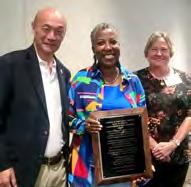
Middle: Wayne County Junior Police Academy participants visit State Court Judge Vi Bennett
Bottom: The Bryan County Courthouse in April 2022

61 COUNCIL OF STATE COURT JUDGES
Council of Juvenile Court Judges
Executive Director: Eric John georgiacourts.gov/cjcj/
Mission:
The Juvenile Courts' mission is to serve the community by assisting children and families in need and to protect the community by administering individual justice and deterring delinquent behavior through the court and community-based services from the Programs arm of the Court and the Department of Juvenile Justice probation services.
Vision:
The Juvenile Courts' vision is to achieve excellence by providing quality services for the positive development of children, the safety of the community and the preservation of the family unit.
The Council of Juvenile Court Judges provides support to the juvenile court judges through legal research services, legislative tracking, and specialized programs to assist in protecting the best interests of children and the state.
Leadership:
President
Judge Render M. Heard Jr.
Tifton Judicial Circuit
President-Elect
Judge Lindsay Burton*
Northeastern Judicial Circuit
Vice-President
Judge Warner Kennon
Chattahoochee Judicial Circuit
Secretary
Judge T. Neal Brunt
Cherokee Judicial Circuit
Treasurer
Judge Maureen Wood
Rockdale Judicial Circuit
Past-President
Judge C. Gregory Price
Rome Judicial Circuit
62 JUDICIAL COUNCIL / ADMINISTRATIVE OFFICE OF THE COURTS ANNUAL REPORT FY 2022
REPORTS FROM APPELLATE COURTS AND TRIAL COURT COUNCILS CONTINUED
*Judge Burton takes office as Superior Court Judge for the Northeastern Judicial Circuit on January 1, 2023. Council ByLaws provide that all officers below the vacant position move to the next office. Judge Michelle Harrison from the Douglas Judicial Circuit will be the new treasurer.
Highlights:
Juvenile Data Exchange (JDEX): The JDEX initiative centralizes data from juvenile court case management systems and the Department of Juvenile Justice’s juvenile tracking system (JTS) on juvenile offenders which provides judges a complete picture of data for juvenile offenders. JDEX was brought online in June 2019. Trainings across the state were held with a shift towards virtual trainings after the onset of the pandemic.
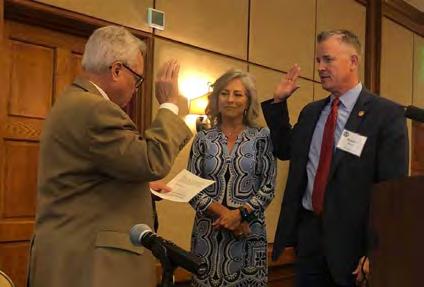
Justice Case Activity Tracking System
(JCATS): Forty (46) counties use this case management system (CMS) that is either JcatsWeb NG or JcatsCourtGA NG in their court. Approximately ninety-three percent (93%) of the delinquent cases in the state are captured by these JCATS CMSs. Since 2015, there has been an increase of 45% of the counties using JCATS.
63
Judge Render M. Heard (right) being sworn-in as president of the Council of Juvenile Court Judges in May 2022.
COUNCIL OF JUVENILE COURT JUDGES
REPORTS FROM APPELLATE COURTS AND TRIAL COURT COUNCILS CONTINUED
Council of Probate Court Judges


 Executive Director: Kevin Holder georgiacourts.gov/probate/
Executive Director: Kevin Holder georgiacourts.gov/probate/
Mission:
Our Council’s vision is excellence in the administration of justice in every probate court. Our Council’s mission is to advance the common interests of and assist probate courts in fulfilling their responsibilities. Finally, our Council’s guiding principles are to ensure that probate courts fulfill their statutory responsibilities, demonstrate integrity, respect the independence and diversity of each court, function collaboratively, continuously improve service to our constituency and engage all members of the Council.
Leadership: President
Judge Thomas Lakes, Harris County
President-Elect
Judge B. Shawn Rhodes, Wilcox County
First Vice-President
Judge Danielle McRae, Upson County
Past President
Judge Kelli Wolk, Cobb County
Secretary-Treasurer
Judge Darin McCoy, Evans County
64 JUDICIAL COUNCIL / ADMINISTRATIVE OFFICE OF THE COURTS ANNUAL REPORT FY 2022
Left: Courthouse dedication ceremony for Judge Jon Payne in Summerville.
Right: CPCJ Strategic Planning session in Columbus.
2022 Spring Conference
Highlights:
• Updated Council’s strategic plan.
• Updated Council’s organizational manual.
• Reformed several Council committees and identified new leaders for committees.
• Revised Uniform Probate Courts Rules relative to electronic filings.
• Developed best practice guidance for involuntary commitment hearings.
• Created ad hoc committees to address e-filing and fee schedule for probate courts.
• Developed specialized training for Article VI probate courts.
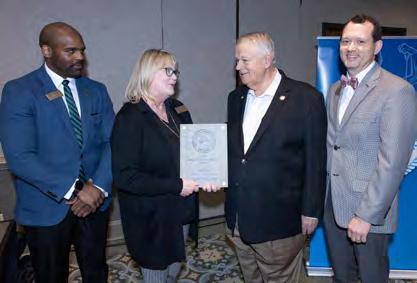

• Created and implemented succession plan for Benchbook and Handbook for probate courts.
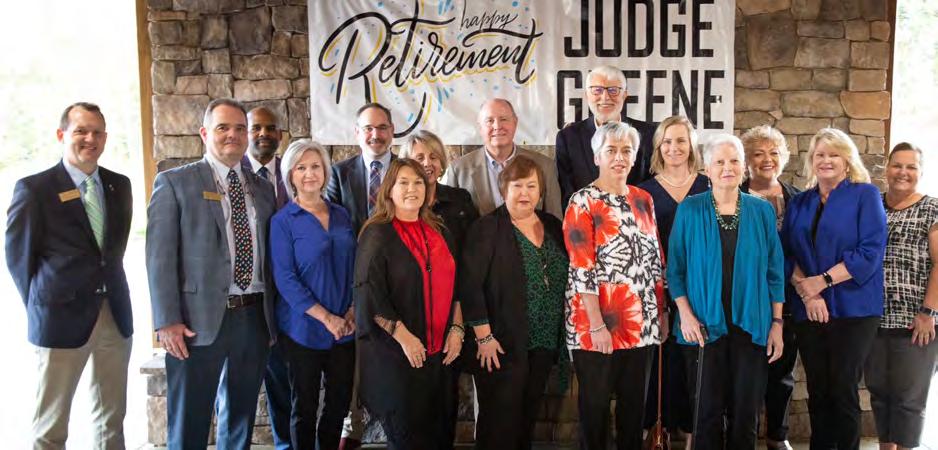
65
Above: Judge Thomas Lakes presents Judge Patty Walters Laine with the Outstanding Probate Judge of the Year award.
Below: Presentation of 2022 CPCJ Legislative Recognition award to House Speaker David Ralston.
COUNCIL OF PROBATE COURT JUDGES
Retirement celebration for Judge J. Mike Greene in Jones County
Council of Magistrate Court Judges
Executive Director: Sharon Reiss georgiamagistratecouncil.com
Mission:
Magistrate court, also called small claims court and sometimes the people’s court, is an informal court that handles money claims of less than $15,000. This court offers a quick and inexpensive process to resolve complaints.
The Council of Magistrate Court Judges supports community justice by:
• Improving the magistrate courts and the administration of justice;
• Assisting the chief magistrates, magistrates, and senior magistrates throughout the state in the execution of their duties; and
• Training and promoting chief magistrates, magistrates, and senior magistrates.
Case type examples include: dispossessory; evictions; four types of criminal misdemeanors; probable cause hearings; setting bond and then binding over to other courts, and some fraud cases.
Leadership:
President
Judge Rebecca Pitts, Butts County
President-Elect
Judge Brandon Bryson, Bartow County
Vice-President
Judge Robert Wolf, Fulton County
Immediate Past President
Judge Quinn M. Kasper, Cobb County
Secretary
Judge Berryl A. Anderson, DeKalb County
Treasurer
Judge Jennifer Lewis, Camden County
Highlights:
• The Council held its first strategic planning session since 2018. Almost all key initiatives from the last strategic plan have been completed. A new strategic plan will be approved in FY23.
• The Council held its annual spring meeting and training in-person in April.

• The Council worked with its Training Council to hold its Spring Recertification in person and to provide video replay and Zoom classes.
• Council judges have won multiple awards for their hard work and dedication to the Council and to the administration of justice.
66 JUDICIAL COUNCIL / ADMINISTRATIVE OFFICE OF THE COURTS ANNUAL REPORT FY 2022
REPORTS FROM APPELLATE COURTS AND TRIAL COURT COUNCILS CONTINUED
Judge Quinn M. Kasper (left) passed the gavel for the Council's leadership to Judge Rebecca Pitts in April 2022.
Georgia Magistrate Courts Training Council
The Georgia Magistrate Courts Training Council, which was created by statute in 1983, consists of six members and oversees the training and certification of Magistrate Judges. O.C.G.A. § 15-10-130 et seq. The Council, chaired by Judge Megan Kinsey (Magistrate Court of Butts County), met twelve times in FY 2022:
• July 21, 2021 – Virtual Meeting
• August 18, 2021 – Virtual Meeting
• September 15, 2021 – Virtual Meeting
• October 13, 2021 – Virtual Meeting
• November 10, 2021 – Virtual Meeting
• December 8, 2021 – Virtual Meeting
• January 12, 2022 – Virtual Meeting
• February 9, 2022 – Virtual Meeting
• March 9, 2022 – Virtual Meeting
• April 24, 2022 – in person during the biannual recertification training held in LaGrange, GA
• May 16, 2022 – Virtual Meeting
• June 8, 2022 – Virtual Meeting
The Council developed and approved the training curriculum for mandatory annual magistrate training, focusing on several topics including landlord/tenant issues, post-judgment actions, search warrants, arrest warrants and bonds, evidence, mental health in the courts, domestic violence, vicarious trauma, debt collection, technology in the courts, and foreclosures.. Continuing efforts from FY 2021, the Council worked to monitor the COVID-19 pandemic and ensure that proper training was made available to all judges through multiple formats including virtual options. Finally, the Council issued certification to magistrate court judges meeting the annual training requirement for CY 2021.
The Council was assisted by two subcommittees: the Curriculum Committee, which studies and recommends possible training topics to the full Council; and, the Mentor Committee, which oversees the mentoring of new magistrate judges.
The Georgia Magistrate Courts Training Council submits this report pursuant to O.C.G.A. § 15-10-134(e).
Magistrate Awards: Judge Megan Kinsey received the Workhorse of the Year Award, Judge Quinn Kasper received the Magistrate of the Year Award, Chief Judge Berryl Anderson received the Lifetime Achievement Award, and Chief Judge Cassandra Kirk received the Humanitarian Award.
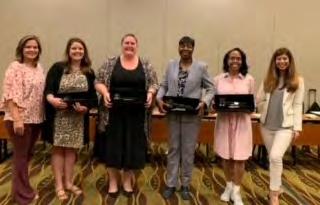
67
Georgia Magistrate Courts Training Council
Council of Municipal Court Judges (CMuCJ)
Trial Court Liaison:
LaShawn Murphy
https://georgiacourts.gov/municipal/
Mission:
To set standards and policies, and to provide information and education services to the Municipal Courts of Georgia so they can more efficiently and effectively operate their courts, administer justice, and serve the public.
Leadership:
President
Judge Lori Duff
City of Monroe
President-Elect
Judge JaDawnya Baker
City of Atlanta
Vice-President
Chief Judge Matthew McCord
City of Stockbridge
Secretary
Judge Nathan Wade
City of Marietta
Treasurer
Judge David Will
City of Clarktson
Immediate President
Chief Judge Willie Weaver Sr.
Cities of Albany, Dawson, Leslie & Sylvester
With the lifting of the Statewide Judicial Emergency Orders issued by former Chief Justice Harold Melton, municipal courts, while increasing in-person proceedings, continued working towards the courts reopening safely and planning accordingly. The past year(s) were challenging and have showed the fortitude of judges and clerks across the State of Georgia. The Council thanks Judge Norman Cuadra for his continued
contributions to the Judicial COVID-19 Task Force.
Highlights:
•“End the Wait. Vaccinate” Challenge Campaign. Chief Magistrate Judge Cassandra Kirk, Fulton County Magistrate, issued a small challenge to metro area magistrate courts that she extended to other councils and justice partners. She invited courts to join them in collaborating on internal/external campaigns to encourage and increase Georgia’s COVID-19 vaccination rates, by conducting pop-up vaccination clinics at the courts through the partnership with CORE and the Department of Public Health. The CMuCJ accepted the challenge and had five courts on tap in the Department of Public Health Gwinnett, Newton, Rockdale (GNR) District to conduct the pop-up clinics.
• As a critical component in assuring continuity in leadership and the yearly development of the CMuCJ, representatives from the Council met August 19-20, 2021, in Douglasville, Georgia, for a day and a half Leadership meeting. Held annually following the election of new leadership, the meeting’s purpose is for the President to share their vision of the upcoming year with officers and key members and to hold discussions regarding any pertinent association initiatives from previous years and those moving forward.
• President Duff and President-Elect Baker served as panelists on the Chief Justice's Commission on Professionalism of Georgia’s CLE: Professionalism
After the Statewide Judicial Emergency Order on September 28, 2021. Discussions took place regarding changes to court rules and the Georgia Code that would help the legal profession to maintain some of the best practices learned as a result of the COVID-19 pandemic.
68 JUDICIAL COUNCIL / ADMINISTRATIVE OFFICE OF THE COURTS ANNUAL REPORT FY 2022
REPORTS FROM APPELLATE COURTS AND TRIAL COURT COUNCILS CONTINUED
• The Council shepherded a “clean up” bill amending OCGA 36-32-2.1 (e) to provide for procedural rules to comport with due process in proceedings to remove appointed municipal court judges. And amended the referenced code section to eliminate the exception for consolidated governments. The Council pursued this measure to ensure that removal proceedings are conducted fairly, statewide. Filed as HB 1275, it was sponsored by Representative Bonnie Rich, (House District 97) and passed on Day 40 (Sine Die) of the session. The legislation became effective July 1, 2022. The Council celebrated, along with the Judicial Council, on the passage of HB 916, the Superior and State Court Appellate Practice Act. This modernization of the statutes streamlines and economizes the appellate practice from a lower judicatory to superior or state court in Georgia. We thank Judge Gary Jackson, Municipal Court of Atlanta, for his steadfast efforts in getting this initiative passed. Lastly, the Council collaborated with Council of Probate Court Judges in to ensure language of SB 353, which achieved final passage as part of SB 10, met the needs of each councils’ best interests and did not create any unfunded mandates or additional burdens on the courts.
• The Council's full Executive Committee met on June 14, 2022, at the Jekyll Ocean Club, Jekyll Island, Georgia. The Council also held its annual Summer Business Meeting and Awards & Recognition Ceremony on June 16, 2022, where the Membership approved the FY22-23 Council Budget and an amendment to the Bylaws adding Article 10 Parliamentarian. Honorable Steve C. Jones, United States District Court for the Northern District of Georgia attended the
Business Meeting as the Council’s guest speaker and administered the oath of office to the newly elected officers.
Honors:
The Council recognized a number of municipal court judges, legislators, and council staff with accolades for various achievements.
• Judge Gary E. Jackson, Municipal Court of Atlanta, received the Frost Ward Lifetime Achievement Award.
• Judge Jennifer Mann, Chamblee Municipal Court and Chief Judge Michael Nation, Municipal Court of Conyers, were awarded the Special Recognition Award as District Representatives.

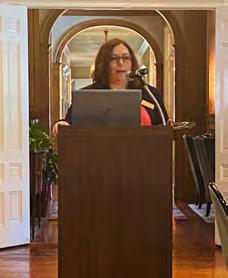
• Chief Judge Gregory Williams, Municipal Courts of Camilla and Pelham was recognized with the Glen Ashman Education Achievement Award.
• The Council’s President’s Award, on behalf of Judge Lori Duff, was awarded to Judge Gary E. Jackson, Municipal Court of Atlanta; Chief Judge Norman H. Cuadra, Municipal Court of Suwannee; Chief Judge Margaret Washburn, Municipal Court of Sugar Hill; Chief Judge Charles Barrett, Municipal Court of Duluth; and LaShawn Murphy, Trial Court Liaison, Judicial Council/ Administrative Office of the Courts.
• The Council also recognized Representative Bonnie Rich (97th district) for perseverance in the General Assembly in sponsoring and passage of HB 1275; Representative Rob Leverett (33rd district) and Senator John Kennedy (18th district) for their perseverance in the General Assembly in the sponsorship and passage of HB 916 Superior and State Court Appellate Practice Act; and from the Judicial Council/ Administrative Office of the Courts Darron J. Enns, Esq., Cheryl Karounos, and Tracy Mason for their tireless legislative efforts for the Council.
69
COUNCIL OF MUNICIPAL COURT JUDGES
Left: Judge JaDawnya Baker and Judge Lori Duff. Right: Judge Lori Duff
REPORTS FROM APPELLATE COURTS AND TRIAL COURT COUNCILS CONTINUED

Georgia Municipal Courts Training Council
The Georgia Municipal Courts Training Council, created in statute per O.C.G.A. § 36-32-22, consists of six members and oversees the training and certification of municipal court judges and chief clerks. The Council, chaired by Chief Judge Matthew McCord (Municipal Courts of Stockbridge and Hampton), met four times in FY 2022:
• November 19, 2021 – Via Zoom
• December 20, 2021 – Via Zoom
• February 18, 2022 – Via Zoom
• June 14, 2022 – (Hybrid) Via Zoom and In Person, Jekyll Island, GA
The other members of the Training Council included: Chief Judge Norman Cuadra, ViceChair; Ms. Cynthia Clanton, Council Secretary & AOC Director; Judge Lori Duff; Chief Judge Rashida Oliver and Judge Rick Ryczek.
The first half of the fiscal year’s training was a duplicate of the CY21 Law & Practice Update. In the second half, the Council developed and approved a robust training curriculum for mandatory new judges’ orientation and annual municipal court judges’ training. A New Judge Track for Municipal Court Judges was offered in March 2022 via Zoom and again in conjunction with the in-person 20-Hour Certification
Law & Practice Update scheduled for June 1517, 2022. The curriculum included plenary sessions on municipal courts from the Honorable Frank Caprio (Chief Judge, Municipal Court of Providence, Rhode Island); Profit & Punishment: How America Criminalizes the Poor in the Name of Justice; Poverty Simulator; Succession Planning/Receiverships; and updates from the Department of Driver Services (DDS) and the Judicial Qualifications Commission (JQC). Additionally, judges were offered the opportunity to participate in Zoom conferences on the
following topics during this time: Processing Trauma; Substance Abuse; Elder Abuse; Judging & Humanities; Mental Health Issues in the Courts; Veterans in the Courts; Jail Diversion; and Court & Personal Security. The Council issued certification to municipal court judges meeting the annual training requirement for CY 2021.
Per statutory requirement, the Council also oversaw the training and certification of chief municipal court clerks. Clerks resumed in-person trainings, offering three recertifications, but also provided a taped on-demand and three live virtual events. Two in-person 16-Hour certification seminars were provided for newly appointed chief clerks. The training curriculum for chief clerks focused on such topics as Municipal Court Uniform Rules; Sovereign Citizens; Fines and Fees; Ethics for Clerks; Mental Illness: How It Presents in Your Court and How to Handle; Legislative Update; How to Communicate with Tact and Professionalism; and, updates from the Department of Driver Services and the Georgia Crime Information Center. The Council issued certification to chief municipal court clerks meeting the annual training requirement for CY 2021.
The Georgia Municipal Courts Training Council submits this report pursuant to O.C.G.A. § 3632-24
70 JUDICIAL COUNCIL / ADMINISTRATIVE OFFICE OF THE COURTS ANNUAL REPORT FY 2022
Chief Judge Matthew McCord Chair, Municipal Courts Training Council.
Appendices
Appendix A: Georgia's Judicial Demographics
72 JUDICIAL COUNCIL / ADMINISTRATIVE OFFICE OF THE COURTS ANNUAL REPORT FY 2022
Supreme Court .................................. 9 Court of Appeals ............................... 15 Georgia State-wide Business Court ........ 1 Superior Court ............................... 218 State Court .................................... 130 Juvenile Court ................................ 126 Probate Court ................................ 186 Magistrate .....................................498 Municipal, Civil, and Recorders Courts ..................... 392 TOTAL.......................................1,576 RACE Supreme Court Court of Appeals GSBC Superior Court State Court Juvenile Court Probate Court Magistrate Court Municipal Court TOTAL WHITE NON-HISPANIC 5 2 8 4 1 131 46 79 24 60 34 73 91 227 173 287 42 1287 WHITE HISPANIC 1 1 1 1 2 1 7 AFRICAN-AMERICAN 1 2 1 10 29 11 15 14 17 5 15 27 64 26 29 266 AMERICAN INDIAN OR ALASKA NATIVE 1 1 ASIAN 1 1 1 1 1 1 2 2 5 15 TOTAL 5 4 10 5 1 143 75 91 39 75 52 78 108 256 242 315 77 1576 MALE FEMALE
Appendix B : Case Characteristics
For breakdown by county visit https://research.georgiacourts.gov/data-and-statistics/
Superior Court — CY 2021 Caseload
The superior court exercises broad civil and criminal jurisdiction. Superior court judges preside over all felony trials, have exclusive jurisdiction over divorces and may correct errors made by limited jurisdiction courts.
Filed Cases:
73
CRIMINAL CIVIL GRAND TOTAL Cases Filed Death Penalty Serious Felony Felony Misdemeanor Serious Traffic Probation Revocation TOTAL General Domestic TOTAL STATEWIDE TOTALS 11 6,222 80,500 21,291 4,678 33,566 146,268 48,904 112,400 161,304 307,572
State Court — CY 2021 Caseload
State courts exercise limited jurisdiction within one county. These judges hear misdemeanors including traffic violations, issue search and arrest warrants, hold preliminary hearings in criminal cases, and try civil matters not reserved exclusively for the superior courts.
Total Filings:
74 JUDICIAL COUNCIL / ADMINISTRATIVE OFFICE OF THE COURTS ANNUAL REPORT FY 2022
CRIMINAL CIVIL GRAND TOTAL Cases Filed Serious Traffic Non-Traffic Misdemeanors Probation Revocations Other Traffic TOTAL Landlord Tenant Other Civil TOTAL STATEWIDE TOTALS 26,090 71,760 14,305 380,330 492,485 1,336 71,066 72,402 579,306
Juvenile Court — CY 2021 Caseload
Juvenile courts handle all cases involving juveniles who are alleged to be delinquent; those who are abused, neglected, or without a parent or guardian; those considered to be children in need of services, guidance, or counseling, including truants, runaways, and ungovernable juveniles; and traffic violations committed by those under the age of 17. The juvenile courts also hear cases involving consent to marriage for minors, enlistment of minors in the military, and emancipation proceedings.
Juvenile courts have concurrent jurisdiction with probate courts in permanent guardianship proceedings over minors and may also handle legitimation and child support matters arising in pending dependency cases. Original jurisdiction over juveniles 13 to 17 who commit certain violent felonies resides in the superior courts.
Total Filings:
75
APPENDIX B: CASE CHARACTERISTICS Total Delinquency Dependency Children in Need of Services Traffic Other Total STATEWIDE TOTALS 20,079 8,418 7,917 6,124 3,387 45,925 Delinquency Filings: Class A Designated Felony Class B Designated Felony Delinquency not designated felony Total STATEWIDE TOTALS 786 933 18,360 20,079
Probate Court — CY 2021 Caseload
Original jurisdiction in the probate of wills and administration of decedents’ estates is designated to the probate court of each county. Probate judges are also authorized to order involuntary hospitalization of an incapacitated adult or other individual, and to appoint a legal guardian to handle the affairs of certain specified individuals. Probate courts issue marriage licenses and licenses to carry firearms.
In counties where no state court exists, probate judges may hear traffic violations, certain misdemeanors, and citations involving the state game and fish laws. Many probate judges are authorized to serve as the county elections supervisor; they also administer oaths of office and make appointments to certain local public offices.
76 JUDICIAL COUNCIL / ADMINISTRATIVE OFFICE OF THE COURTS ANNUAL REPORT FY 2022
Initial Filings Criminal/ Traffic Mental Health TOTAL STATEWIDE TOTALS 53,205 217,234 5,351 275,790
Firearm Application Birth Records Death Records Marriage License Issued Passports Miscellaneous TOTAL STATEWIDE TOTALS 287,974 73,838 54,475 67,954 3,594 2,940 287,974 Administrative
Total Filings:
Actions:
Magistrate Court — CY 2021 Caseload
Magistrate courts are county courts that issue warrants, hear minor criminal offenses and civil claims involving amounts of $15,000 or less. A chief magistrate is usually elected in each county; other magistrates may be appointed by the chief magistrate, though some also run for election.
Magistrate court is the court of first resort for many civil disputes including: county ordinance violations, dispossessories, landlord/tenant cases, and bad checks. In criminal matters magistrates hold preliminary hearings; issue search warrants to law enforcement and also warrants for the arrest of a particular person. In some criminal matters magistrates are authorized to set bail for defendants.
No jury trials are held in magistrate court; civil cases are often argued by the parties themselves, rather than by attorneys.
Total Filngs:
77
CRIMINAL CIVIL Misdemeanor Ordinance Violation TOTAL Civil Claims Dispossessory Distress Warrant Garnishment Foreclosure Attachment TOTAL GRAND TOTAL STATEWIDE TOTALS 3,118 21,735 24,853 191,827 183,891 46,253 26,971 438,942 463,795
Warrants Hearings STATEWIDE TOTALS 207,247 36,208 Warrants and Hearings: APPENDIX B: CASE CHARACTERISTICS
Municipal Court — CY 2021 Caseload
Cities in Georgia establish municipal courts to adjudicate traffic offenses; local ordinance/ violation cases (involving building code matters that include illegal dumping, excessive noise, zoning, animal control, and similar cases); conduct preliminary criminal hearings; issue warrants; abate nuisances; and in some cities hear misdemeanor shoplifting, criminal trespass, and possession of marijuana cases.
Filings:
78 JUDICIAL COUNCIL / ADMINISTRATIVE OFFICE OF THE COURTS ANNUAL REPORT FY 2022
TRAFFIC Serious Traffic Civil Traffic Parking Violation DUI Traffic TOTAL STATEWIDE TOTALS 25,916 41,281 12,734 15,434 739,961 835,326 Total
Total Traffic Ordinances Misdemeanors Total Civil Drugs/ Marijuana TOTAL STATEWIDE TOTALS 835,326 38,339 53,996 48,263 9,403 985,327
Thanks to our partner organizations:


























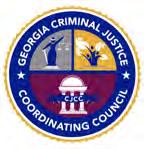

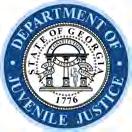
Suite 300
Atlanta, Georgia 30334
georgiacourts.gov





Judicial Council of Georgia Administrative Office of the Courts
244 Washington Street, SW


















 Cynthia H. Clanton, Esq. Director Administrative Office of the Courts
Cynthia H. Clanton, Esq. Director Administrative Office of the Courts













































































 Executive Director: Kevin Holder georgiacourts.gov/probate/
Executive Director: Kevin Holder georgiacourts.gov/probate/








































